We write Stevens history
Techfest Performers Announced!
BY KAYDEN CANNILLA, OUTREACH CHAIR

Stevens’ largest event for the Spring semester is on Saturday, April 29th on Palmer Lawn, from 5 to 9 p.m. There will be giveaways, raffles, food, and activities.
STEVENS DRAMATIC SOCIETY’S THE PROM
BY NICOLE GIARDINO, LAYOUT EDITOR
Last week, the Stevens Dramatic Society (SDS) presented their highly anticipated 2023 Spring Musical, The Prom, with performances held at the DeBaun Auditorium from March 30 to April 1.
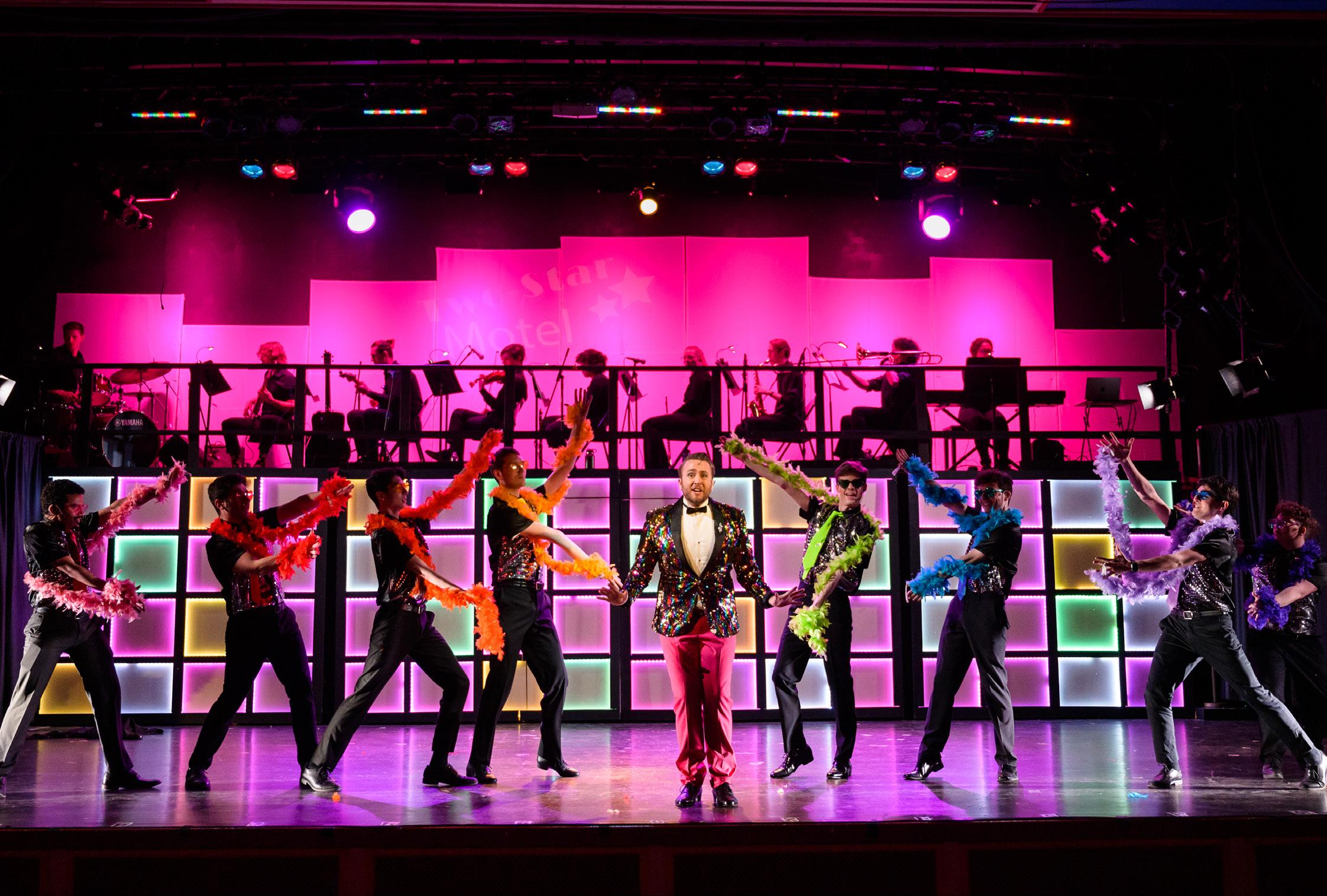
Despite unforeseeable external obstacles that nearly made the show impossible to put on, the cast and crew pushed through
SAVE hosts Earth Day event
BY EVAN PAPAGEORGE, OPINION EDITOR
Every year, the world comes together to celebrate something important to everyone: the world itself! Earth Day, which is on April 22 of each year, is a day that celebrates the Earth and advocates for awareness of climate change and other environmental causes. Here at Stevens, there are many ways to be more involved in protecting the Earth. One upcoming way for students to help the environment is through an event run by the Sustainability, Activism, Volunteering, & Engineering Club (SAVE).
The event is scheduled to take place on Palmer Lawn from 1 to 4 p.m. on Wednesday, April 19. It will be filled with many fun activities including food, lawn games, music and record painting, slime-making, tote-bag painting, and houseplant potting. Additionally, there will be raffles available for students to make small donations to have a chance at many prizes. All proceeds will go to the Nature Conservancy Earth Day Match Fund, an international non-profit, environmental protection organization
SEE EARTH PAGE 2
to make their show’s run an overwhelming success.
The sudden illness of Carly Teitelbaum (Dee Dee Allen) and Luke Magette (Nick) a week before the show led to the entire show being reblocked with understudies as a precaution in case the two did not recover in time for opening night. Fortunately, the two recovered in time, and they were able to perform in their respective roles as planned. With the recent water main break
What’s StevensConnect?
ADVAIT DANTULURI, STAFF WRITER
What is StevensConnect, the software recently launched by Stevens? According to an email sent out by the service’s new address, StevensConnect is a resource that allows Stevens students to interface with experienced alumni, join all kinds of groups, and learn about the different career paths a student can take. It is a reliable way for students to form all kinds of connections and make decisions on possible future career paths, in a manner very similar to websites like LinkedIn and the Handshake app. StevensConnect stands out from those, however, by allowing students to connect better with people that have experience studying at Stevens and know the ups and downs of navigating the workforce.
When students log in, they will be asked a series of questions that can help StevensConnect determine the right alumni and resources for each user. At the Home page, students are given the option to explore career paths, connect with people that are able to help with others, and watch videos from
SEE CONNECT PAGE 2

disrupting a week of rehearsals, alongside an additional week off for spring break, the cast and crew had to work overtime to get everything show-ready in time for opening night.
The Prom revolves around a high school senior from Indiana, Emma Nolan played by Kiera Kennedy, a teenage lesbian who wishes to attend her school’s senior prom with her girlfriend, Alyssa Greene, played by Anusha Qaisar, as her plus
one. Out of their homophobic rhetoric, their town quickly riots against the couple, ultimately leading to the entire prom being canceled. Four washed-up, narcissistic Broadway stars stumble upon this story on Twitter, and decide to take on this project for an “act of service” in an attempt to regain their lost humility and restore their reputation. The four, Dee Dee Allen,
Governor Phil Murphy announced as commencement speaker
BY EVAN PAPAGEORGE, OPINION EDITOR
As part of any graduation-day ceremonies, the commencement is always a highly anticipated part of the proceedings. Part of that, the commencement speaker stands a key part of the ceremony. This year, as nearly 2,800 students’ degrees are conferred, the largest pool in Stevens history, the commencement speaker will be none other than the Governor of New Jersey, Phil Murphy.
Governor Phil Murphy, born in 1957, was elected Governor of New Jersey in 2018 following a career of excellence across disciplines. After working for over 20 years with Goldman Sachs, he became the American Ambassador to Germany under President Obama.
This year, he also holds the position of chair of the National Governors Association. His policies range from mental health awareness to the protection of communities, like immigrants and LGBQTIA+. In his time as governor, he has led New Jersey to have more green energy and to be more environmentally friendly, while at the same time introducing many new companies to diversify the economy of New Jersey.
In an article from Stevens, President Farvardin offers in-
Student entrepreneurs. artists, designers, and writers will have their goods on display at the Duck Market during the first half of the event, along with a variety of activities. These include inflatables, games, souvenirs, a photobooth, and other fun surprises. Student performers Sofie Lopez, Butane, and Dale will take to the stage throughout the night, starting shortly after 5 p.m. Closing out the night will be our headliner Peach Tree Rascals, best known for their breakout 2019 hit “Mariposa.” The Stute will continue to collaborate with the Entertainment Committee (EC) and the student performers in the lead up to Techfest, and a brief introduction to some of the performers is as follows.
Sofie Lopez (she/they) is a Music and Technology (M&T) major who sings and plays piano, guitar, and ukulele. They describe music as an integral part of their life, “I started piano lessons when I was 9 and began vocal lessons a year after that. It was the only extracur-
ricular I ever gravitated to, and I loved the expressiveness and creativity of it.” Lopez is influenced by artists like dodie, Billie Eilish, and The Drums, and describes her sound as similar to Phoebe Bridgers and Clairo.
Butane was formed in Fall 2022 and has been playing gigs in the NYC area for the past several months. The group is made up of five Stevens students: founder Jack McDermott (CPE 4/4) on guitar, Alec Pagano (M&T 4/4) on rhythm guitar, Michael Hoovler (M&T 3/4) on lead vocals, Mark Huggins (M&T 3/4) on keyboard, Sam Sherwood (M&T 3/4) on bass, and Jack Piccirillo (M&T 3/4) on drums. Their influences include The Backseat Lovers, Hozier, John Mayer, Ween, and Led Zeppelin. They describe themselves as “a proto neo soul occult blue collar emo indie boy band from Hoboken, NJ” and have just released their first song “Credit,” available everywhere. Peach Tree Rascals formed in 2018, composed of five Bay Area Californians, singer-rappers Isaac Pech, Tarrek Abdel-Khaliq, Joseph Barros, producer Dominic Pizano and creative director Jorge Olazaba. Their music is characterized by beachy melodies, introspective rap-singing, and a blend of pop, R&B, and indie rock.
How do Mobile DuckCards really work?
sight into the selection and honor of selecting Governor Murphy as the commencement speaker. He explains, “At Stevens, we are in lockstep with the governor’s efforts to expand the innovation economy in New Jersey, to reverse the ‘brain drain’ that exports talented students out of state for college and careers and to improve mental health and wellness, especially among young populations. It is a distinct honor that our graduates, poised to begin a new chapter in their lives, will hear a keynote address from a leader who has distinguished himself in the state, national and international arena. I look forward to celebrating the achievements of our students, faculty and staff with Gov. Murphy.”
As 71% of the Stevens students graduating this semester will be employed in or around the New Jersey area, the successes and work of Governor Murphy will directly affect many of the students conferring their degrees. As Stevens welcomes their next generation of graduates, Governor Murphy will also be conferred an honorary doctor of business administration degree. On what will surely be a celebratory day, Governor Murphy will give a welcoming commencement address as the Stevens graduates begin their lives.
BY BENJAMIN KNOBLOCH, NEWS EDITOR
Stevens has announced that the DuckCard system will be transitioning to a mobile model, allowing students to use their smartphone’s ecard functionality around campus instead of carrying physical plastic cards. However, the initial release from the Department of Information Technology and DuckCard Office left a number of questions unanswered. Just what are the intricacies of the new system, what kinds of changes are being made around campus to accommodate it, and what do Stevens students think about it all?
Many students have already set up their Mobile DuckCards through the Transact eAccounts App, and Stevens has told The Stute that all readers around campus should now be tap-enabled. However, according to students who spoke with The Stute, the DuckCard Office policies surrounding this transition are unclear.

Although Mobile DuckCards currently operate in conjunction with the existing plastic cards, Stevens has told The Stute that this is only a transitory protocol until May 31. “During the
rollout of Mobile DuckCard, Plastic DuckCards were kept enabled to serve as a backup option in case anyone encountered issues with their Mobile DuckCard, device, or card readers,” said Tej Patel, Vice President for Information Technology and Chief Information Officer for the university. “However, soon, plastic DuckCards will be disabled for individuals who have an active Mobile DuckCard. The upcoming update to the Transact software will introduce a tool that will automatically disable plastic cards when a Mobile DuckCard is created.”
To even use the new system, however, requires that a student have a modern smartphone with near field communication (NFC) capabilities, which is what allows contactless mobile payment services like Apple Pay to work. iPhones predating the iPhone 6, as well as many more modern non-Apple devices, lack the hardware necessary for contactless payment. If you don’t know if your smartphone is NFC-enabled, reference this list to find out.
According to Mr. Patel and Oscar Hernandez, Operations Coordinator for the DuckCard Office, Stevens will work with such stu-
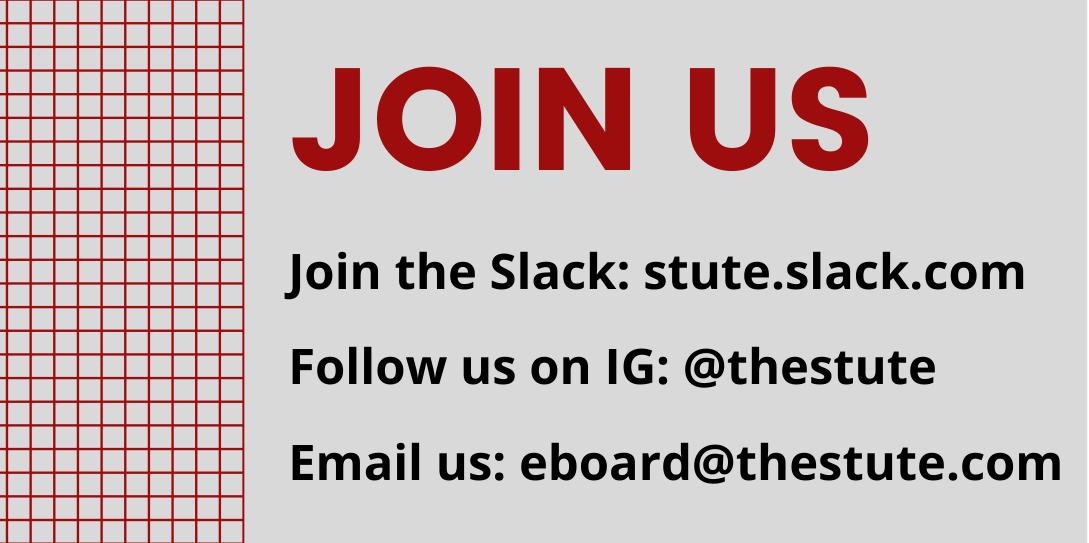
HOBOKEN, NJ | APRIL 14, 2023 VOLUME CXX No. 22 NEW STUTE EVERY FRIDAY • EST. 1904 The student newspaper of Stevens Institute of Technology, and creator of Attila the Duck. www.thestute.com TikTok @thestute Instagram @thestute facebook.com/stevensthestute Admitted students, welcome to Stevens! NEWS (2-3) SDS’s The Prom, Techfest Performers, and more Read about the new mobile duckcards and The Stute’s investigation into Beta Theta Pi’s Probation status. FEATURE (4-5) LGBTQ+ Community and Admitted Students Weekend! Find out how Stevens celebrates it’s current and incoming students. SCIENCE (6) Learn more about the psychology behind the phrase “I bet you can’t...” and when lying can actually be beneficial. PULSE (12) Read answers from the Stevens community to our weekly Roving Reporter, plus solve our weekly puzzle and sudoku.
SEE PROM PAGE 2
PHOTO COURTESY OF JEFF VOCK
PAGE 2
Peach Tree Rascals, Sofie Lopez, Butane, and Dale
SEE CARDS
Masthead Volume CXX No. 22
Executive Board
EDITOR-IN-CHIEF......................................ISABELLA ZIV ‘25
BUSINESS MANAGER............................TANYA AVADIA ‘26
MANAGING EDITOR.......................................AVA WANG ‘25
LAYOUT EDITOR................................NICOLE GIARDINO ‘25
OUTREACH CHAIR KAYDEN CANNILLA ‘24
DIGITAL MANAGER................................RAFAEL LEE LI ‘24
SECRETARY CLAIRE HANNAN ‘24
HEAD COPY EDITOR KEENAN YATES ‘24
Editorial Board
NEWS EDITOR.........................................BEN KNOBLOCH ‘25
NEWS EDITOR.....................................ASWIN AGUINAGA ‘23
SCIENCE EDITOR.........................................ERIN MCGEE ‘25
OPINION EDITOR............................EVAN PAPAGEORGE ‘26
SPORTS EDITOR........................................CHRISTA RUIZ ‘25
FEATURE EDITOR..................................TASHA KHOSLA ‘25
ASSIS. COPY EDITOR ISABELLA HAMM ‘25
Operations Board
HEAD PHOTOGRAPHER......................OLOF PERSSON ‘25
SOCIAL MEDIA MANAGER............VANESSA HUERTA ‘23
Staff & Contributors
Advait Dantuluri
Anais Bouchatta
Charles Beall
Ethan Kleschinsky
Julia wierzbicki
Jordyn Ramelli
Josephina Strano
Kai Wong
Katie Bloomer
Kyle Slendorn
Marisa Powers
Matthew Brantl
Mia Petrolino
Nick Smith
Quentin Jimenez
Rachel Abraham
Ruthie Mullisky
Stephen Pachucki
Trevor Dameika
Victoria Yaschuk
PROM
CONTINUED FROM PAGE 1
Barry Glickman (played by Corey Batchelder), Trent Oliver (played by Nicolas Re), and Angie Dickinson (played by Isabella Cruz), take the trip from New York City to Indiana, and have to unlearn a lot of their self-serving ways, while also aiding Emma. Even though their intentions were selfish, the Broadway stars end up helping this town to grow into an inclusive and welcoming space.
With show-stopping numbers including Teitelbaum’s energetic interpretation of “The Lady’s Improving,” and the hilariously executed songs, “The Acceptance Song” and “Love Thy Neighbor,” both led by Re, this show brought the audience through a whirlwind of emotions. Further, Kennedy’s powerful vocals and emo-
EARTH
CONTINUED FROM PAGE 1
that helps advocate for the Earth with over 100 projects across more than 70 countries and territories all around the world.
Although this event is primarily run by SAVE, this will be a joint effort with participation from many different clubs like Stevens Environmental Engineering Professional Society, the Stevens chapter of the American Institute of Chemical Engineers, and WCPR — Castle Point Radio.
Although it is not hard to tell, this event will focus on Earth Day. The proceeds and awareness raised by this event come at a crucial time in the fight against climate change.

In the United Nations’ State of the Climate, Secretary-General António Guterres says the world is in a cli-
CONNECT
All opinions and editorials reflect the views of their respective author(s). No Part of The Stute may be reproduced in any form, in whole or in part, without the written consent of the Editor-in-Chief. Cited references of The Stute are permitted.
All members of the Stevens community are able to submit a Letter to the Editor to be published in The Stute. Letters must refer either to a piece published in The Stute or to The Stute in general and must be between 400 – 800 words in length. Submit letters to editor@thestute.com with your name and title (when applicable) or using our Google form. For writers who wish to write a Letter to the Editor anonymously, please see our policy on anonymity.
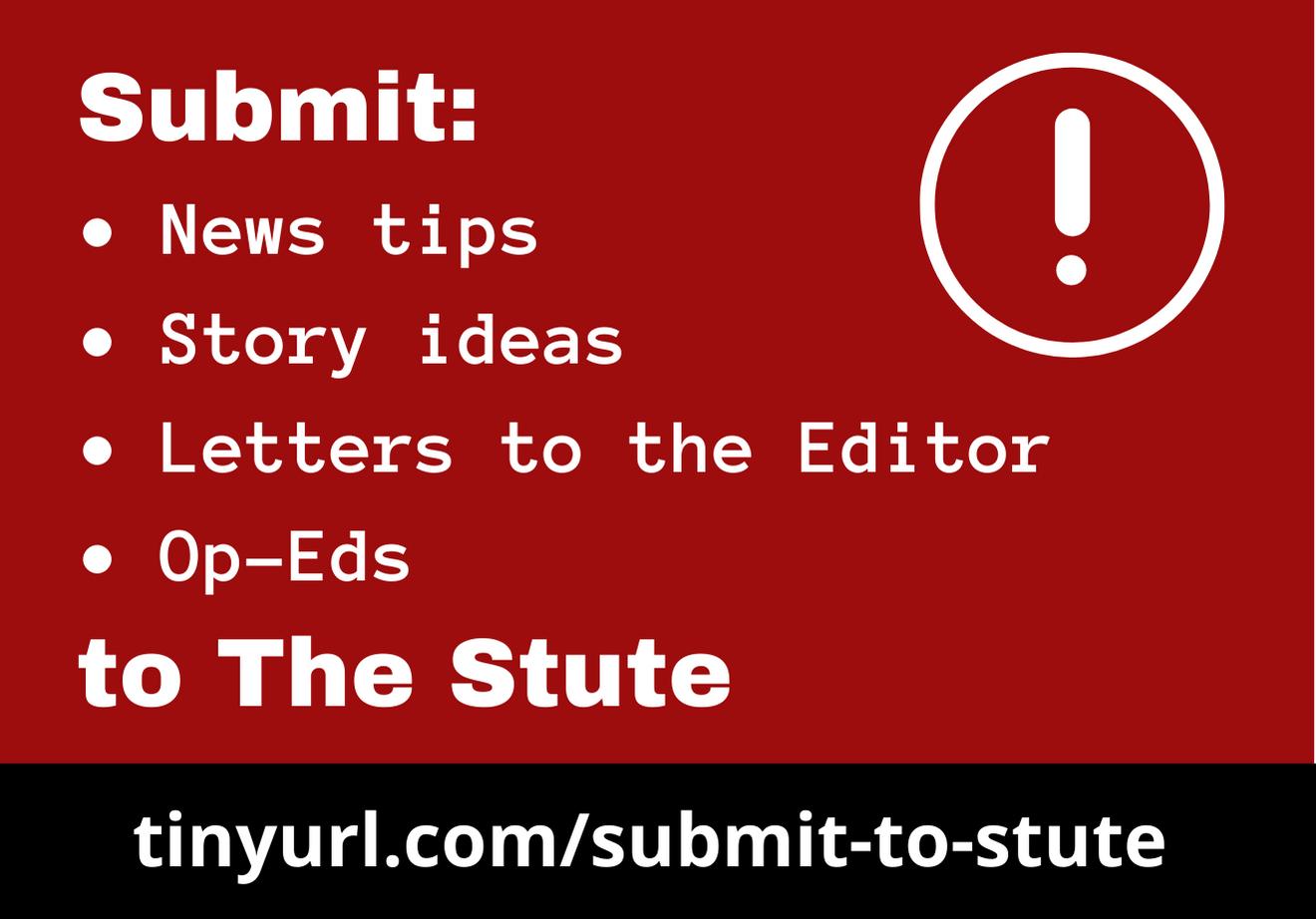
The Editorial Board reserves the right to choose whether or not to publish a submitted Letter to the Editor based on a majority rule vote, and additionally reserves the right to edit letters for clarity or request authors to revise. Provided that the author approves the final version, The Stute reserves the right to edit letters according to our copy editing procedures, defined in our policies.
All members of the Stevens community are able to submit a standalone opinion piece (otherwise known as an Op-Ed) to be published in The Stute. Op-Eds must be between 400 – 800 words, but longer submissions will be considered on a case-by-case basis. To submit an OpEd please email eboard@thestute.com with your name and title (when applicable) or using our Google form (tinyurl.com/submit-t0-stute). For writers who wish to write an Op-Ed anonymously, please see our policy on anonymity.
The Editorial Board reserves the right to choose whether or not to publish a submitted Op-Ed based on a majority rule vote, and additionally reserves the right to edit Op-Eds for clarity or request authors to revise. Provided that the author approves the final version, The Stute reserves the right to edit Op-Eds according to our copy editing procedures, defined in our policies.
tional performance brought the audience to tears as she sang the show’s signature songs, “Dance with You” alongside Qaisar, and “Unruly Heart.”
But it wasn’t just the lead actors who shone in this production. The ensemble cast provided energetic and entertaining performances throughout the show, particularly in the dance numbers. This show is extremely dance-heavy and pulls inspiration from a multitude of other Broadway shows such as Chicago with the song “Zazz,” and Evita with the song “It’s Not About Me.” The choreography was electric and complex, showing the true talent of the ensemble cast. This show was also supported by the rest of the cast: Kyle Castillo, Taylor Terry, Charles Beall, Rachel Germain, Hannah Goldschmidt, Luke Magette, Cameron Clifford, with the ensemble, Valerie Calligy, Brooke Delo, Leticia Gonzalez, Kai Goz,
mate crisis, “a code red for humanity.” SAVE encourages all members of the Stevens community, and beyond, to get involved in Earth Day in any way they can. As SAVE Co-President Emily (Em) McCormick says this event will help “promote sustainability and raise environmental
Nicholas Hite, Sofia Lopez, and Christopher Ocker.
Additionally, the high schoolthemed costumes, including some borrowed from the actors’ own closets, added an authentic touch. The live orchestra, primarily composed of students, was exceptional, handling the challenging score with ease. The Crew was led by Producer and Production Manager, Gab Poska, who also served as the Set Designer and Master Carpenter.
Overall, the SDS’s production of The Prom was a resounding success, showcasing the talents of its cast and crew and delivering a message of inclusivity and acceptance that resonated with the audience.
You can follow the Stevens Dramatic Society on their social media platforms: Facebook Twitter and Snapchat: @SDS1910 or Instagram: @SDS_1910
awareness.” For more information, Em suggests those interested follow SAVE on Instagram at @stevenssaveclub and attend their GBMs.
If you are interested in volunteering for the Earth Day event, sign up using the google form: https://tinyurl.com/EarthDaySAVESignUp
CONTINUED FROM PAGE 1 CARD
their community. At the Career section, students can look for jobs in a manner similar to Handshake and Linkedin, look for potential careers if they are undecided on what they
CONTINUED FROM PAGE 1
dents and continue to offer physical plastic cards. “We understand that some students or faculty/staff might have incompatible devices, so the physical DuckCard will always be available for those that need it,” explained Mr. Hernandez.
Mr. Hernandez also offered insight into why the Mobile DuckCard system was developed and why it is being implemented now. “The initiative was taken to keep Stevens at the forefront of innovation. By the way, we are the first university in New Jersey to have implemented mobile credentials,” he said. He listed some reasons for the change, including the reduction of plastic waste, saving costs for both the school and students by eliminating the card loss fee, and saving time for the DuckCard Office, which no longer has to print a large number of new cards. Mr. Patel called the new system a “secure and user-friendly platform that is cost-effective and fully managed by Stevens IT, ensuring a seamless and hassle-free experience for all.”
In response to a question about how the changes will affect the DuckCard Office, Mr. Patel said that “in light of the decreased volume of activities in the DuckCard Office, other resources have been redirected to support Workday Student and other systems utilized by Student Accounts. The DuckCard Office will still employ student workers as necessary.” Mr. Hernandez said that the office has not changed for now and is preparing for the approaching summer and fall semesters.
The administrators also want to remind students that signing into Mobile DuckCard on multiple devices is considered ID duplication, which is strictly prohibited by the school’s terms and conditions and
want to pursue, or create projects in order to gain experience. The Connect section allows students to meet up with network professionals, as well as connect with groups that include students from previous years, and events a student can attend in person or online. The Resources section allows students to view experiences to gain knowledge
will be enforced. “These users will have three days to comply, or we will disable their ability to provision a Mobile DuckCard,” warned Mr. Hernandez.
At the time of this article’s publication, several services around campus that require a school employee to hold student IDs, including library study room reservations, still required a physical DuckCard. In response to this, Mr. Hernandez noted, “We are working with departments such as the library to find alternative processes. We are still ironing out such issues and hope to finalize them by the summer just before the start of the incoming class.”
Mobile DuckCards appear to have garnered a mostly positive reception among the student body. The students with whom this reporter spoke were largely optimistic about the new system, which they viewed as improving the convenience of accessing rooms and making payments around campus.
Kevin Castner Jr., a student with extended early access to Mobile DuckCard, called himself a “pretty big fan” of the new system. “I usually have my phone already in hand as I am walking to a door or through a turnstile, so a quick tap is often very convenient.” However, he noted some perceived problems of the new system. “I know of some doors in the towers, including the one to my apartment, that the eAccounts DuckCard does not work on currently. [...] I do not think it’s a very good idea to completely eliminate the physical DuckCard. If your phone breaks or dies without a physical DuckCard as a backup, both the key to your building and the means to call somebody to let you in are gone. I would also hope that student organizations who currently use magstripe readers to keep track of event attendance are given or are partially subsidized by Stevens for [NFC] readers.”
Another student, who started using Mobile DuckCard after the
on what to do when entering the workplace, and also provides some articles, videos, and a business directory to help students even more. Finally, the Inbox allows students to see their connections and messages.
If you are looking for another way to make connections and gain experience, go right ahead and start using StevensConnect!
official launch, said that he already never uses the physical one, and thinks that the new mobile infrastructure was implemented “surprisingly well.” However, he also expressed concern about the planned retirement of physical cards for most students. “I think the majority of people come across a time where they need some form of student ID in other situations outside of college to prove they are students. If they want to make it a choice that’s fine, but they should make it very well known that it’s an option.” When this reporter told the student about the security reasons for limiting DuckCards to only mobile or physical for any given student, he said the change made more sense to him. “I think deactivating them makes sense so people can’t give their IDs to other people and still be able to use it as well from their phones. I like the idea of not letting people have multiple IDs to scan with, as people could give their IDs to other people to buy food with at the dining locations on campus, which I’ve already witnessed.”
Another student, who said he owns a phone that isn’t compatible with the new Mobile DuckCards, also liked the changes. “Nothing changes for me and everyone who has a compatible phone gets to enjoy the benefits,” he said. “As long as they keep everyone who doesn’t have a compatible phone in mind, I’m happy.”
There are other features of using Mobile DuckCard that some students aren’t aware of. Phones running iOS can be used as a DuckCard while asleep, and many phones, including iPhones, can unlock rooms and be allowed to pay even with too little remaining battery to turn on normally.
Those with further questions about the new service can contact the DuckCard office at duckcard@ stevens.edu or visit the office on the first floor of the Howe Center.
2 Friday, April 14
News Contact Us Corrections
on
to the
on Op-Eds FULL LIST ON thestute.com/policies GENERAL.........................................EBOARD@THESTUTE.COM EDITOR-IN-CHIEF.........................EDITOR@THESTUTE.COM ADVERTISING.............................BUSINESS@THESTUTE.COM OFFICE.................................UNIVERSITY CENTER ROOM 216B NOTICE A MISTAKE? Email us at eboard@thestute.com.
Disclaimer Policy
Letters
Editor Policy
Stevens welcomes Dr. Kubacki as Assistant Dean of Advising
BY EVAN PAPAGEORGE, OPINION EDITOR
Recently, Stevens welcomed Dr. Matt Kubacki as the new Assistant Dean of Advising in the Office of Undergraduate Academics, effective March 13, as Stevens strives to make the academic experience the best it can be. Many different offices and departments must work collaboratively for the school to run smoothly. For these departments, a leader often oversees that section of the university and reports on its ongoings. This is typically a Dean, an Assistant
Dean, or a director. For the Office of Undergraduate Academics, the Assistant Deans oversee the individual parts of Stevens education.
In his new position, Dr. Kubacki will help in onboarding and training new members of the academic advisors here at Stevens, per guidelines set by the National Academic Advising Association. As Assistant Dean of Advising, a new role that Dr. Kubacki will be the first to fill, he will help improve the student experience here at Stevens.
Dr. Kubacki earned his Bachelor of English from Boston College, a Master’s in English
Rutgers threatens legal action after 9000 employees walk out
BY QUENTIN JIMENEZ, SCIENCE WRITER
More than 9000 faculty and graduate students at Rutgers University staged a walkout Monday morning amid a tense labor dispute over salary increases, affordable housing, childcare, and healthcare. Organizers from three local unions, representing fulltime faculty, graduate workers, postdoctoral researchers, counselors, part-time lecturers, and medical professionals, began the strike after almost a year of failed negotiations and the University continuing to not recognize their most essential demands. The walkout is the largest strike of public workers in New Jersey’s history, as well as being the most prominent strike in the state in the last 50 years.
This movement comes on the heels of other recent labor strikes, like the similar 50,000 faculty strike at the University of California, 30,000 teachers from the LA school district, or the numerous Amazon and Starbucks locations, slowly earning their right to collectively bargain over the past several years.
And yet, while all of these workers continue to fight for the rights and pay they deserve, the invisible hand of the free market works to keep them down and protect the capital at the top. In their official response to the strike, Rutgers University warned that they “may
go to court to maintain university operations and protect our students, patients, and staff,” citing their belief that there are no legal protections for public sector workers to strike in New Jersey.
However, the faculty and graduate students are not the only of the working class to be affected by the endless union-busting techniques used by capital owners. While instances of unionizing seemed to be on the rise last year, so too was the rate of unfair labor practices. Some companies, like Chipotle, prefer to close stores over having their workers organize. Others, like Amazon, are spending tens of millions of dollars on illegal mandatory anti-union courses for their employees. Even still, some prefer the most direct method like Starbucks, who has fired over 100 union leaders from their stores since the movement began.
Corporate actions like these have led the ever declining rate of union membership to reach its lowest point in recorded history, further fueling the income inequality and class warfare that plagues our country.
While little can be done to mediate the vast problems with our economic system, you can continue to show your solidarity for workers by supporting their efforts, pushing for labor rights, or as one creative junior at Rutgers put it, skipping class in order to support striking faculty and friends.
Language and Literature from Marquette University, and an Ed.D. in Higher Education/Higher Education Administration from Northeastern University. He has served as a literature professor and in other higher education positions, from Associate Dean for Student Success at St. Joseph’s University to his most recent engagement before Stevens as the Dean for Academic and Career Engagement at Wagner College.
The Stute reached out to Dr. Kubacki about his new position. This new position, Dr. Kubacki explains, “shows that Stevens has a strong commitment to student
success and how the advisor-student relationship is viewed as an important aspect of that.” In this new role, Dr. Kubacki hopes to “work collaboratively with each School at Stevens, their undergraduate student success offices and advisors, and other campus offices to support ways we all try to provide service to students and support students on their journeys to what they want to accomplish” through “building connections between all aspects of an undergraduate student’s experience at Stevens to provide more seamless support of the quality Stevens students can expect from such a pres-
tigious institution.”
Dr. Kubacki reflected that his appointment “illustrates how others view my dependable leadership, my dedication to meaningful communication and collaboration, and my experiences in creating trust and making knowledgeable decisions that can unite others around common goals.” To finish, Dr. Kubacki said, “I am excited to be part of Stevens at this point in its history. I hope I can honor its strong history by bringing what I can in terms of student support to its future. I feel very welcomed by the Stevens community.”
Hoboken Exotica exposed for illegal drug sales
 BY KATIE BLOOMER, STAFF WRITER
BY KATIE BLOOMER, STAFF WRITER

Hoboken Exotica was exposed for illegal sales of cannabis and other THC products. The store, located on 521 Washington Street, had only opened a few months prior. Their November opening showcased an extensive display of exotic snacks, CBD products, vapes, and everyday essentials. Although their theme appeared to be centered around marijuana, they were only legally permitted to sell CBD, not THC, due to a lack of a license.
Members of the community began to complain about Hoboken Exotica selling marijuana and THC products out of the shop without a federal or local license. The Hoboken Police Department Street Crimes Unit began an investigation last month in response to the concerns. A series of undercover purchases were made across multiple weeks, proving that illegal sales of marijuana were occuring.
On March 30, the 32-year-old
owner, Esa Alsaedi, was arrested and charged with employing a juvenile in a drug distribution scheme, which is a second-degree crime. Alsaedi was released pending a court date. A 33-year-old worker was charged with multiple counts of Controlled Dangerous Substances Distribution. Due to the location of the shop, charges were more severe, involving sale within 500 feet of public proper-
ty, a park, and 1000 feet of school property. Brahim was released on his own recognizance and is pending a court date. A juvenile, whose identity has not been revealed, was also involved in the illegal drug distribution and was processed for their role, then released.
The storefront remains, and it has yet to be announced what will happen to the business, or if something else will take its place.
Beta Theta Pi’s failure to comply with national substance-free housing policy
BY THE STUTE
Timothy Piazza died on February 2, 2017, from both a fractured skull and a lacerated spleen during initiation night at Penn State’s chapter of Beta Theta Pi. The aftermath of the tragic incident involved a pre-litigation settlement for the Piazza family, with the national Beta fraternity agreeing to make all Beta houses substance-free starting in 2018. Five years later, the Sigma chapter of Beta Theta Pi at Stevens has failed to observe this national rule and implement it within their house.
According to Beta National’s Substance-Free Housing Transition Guide, efforts to remove substances from all Beta houses were “to be carried out in two phases across multiple years, with all Beta homes becoming substance-free by August 2020.” The transition timeline states that Beta houses were supposed to observe the following protocol before August 15, 2018: “No hard alcohol within chapter housing, all common spaces must be substance-free.”
The Beta national website goes on to describe a chapter in “Good Standing,” as one that abides “by federal and state laws and all Beta Theta Pi policies, including the Risk Management Policy and Substance-Free Housing Policy,” putting Stevens’ Beta chapter in a compromised position due to their failure to comply.

Stevens student Samantha Reilly was friends and teammates with Timothy Piazza. She has long been advocating for reform towards the Sigma chapter’s practices and reignited the discussion on why they are not compliant with national rules. In an interview with The Stute, Reilly mentioned Beta “has been continuing to host parties and mixers serving alcohol in their house.”
Reilly alerted Stevens of Beta’s national “dry” policy in February of 2021 and mentioned that the Stevens administration “had no
knowledge of this, even though it was to have been adopted at least a year and a half prior to that.”
In terms of the proactiveness of administration, Reilly stated, “it only seems like discussions are being had with the chapter about how they can finally ‘adapt this policy’, but no punishments or reprimanding seems to have taken place.” As far as The Stute knows, Beta has hosted parties with substances in their house this semester and has also attempted to host mixers with sororities without registering them through Stevens. Beta also allegedly told sororities that they should not post their parties on social media, seemingly with an intent to conceal the substances at their parties. These calculated moves imply that Beta is knowledgeable about its violations of the substance-free housing policy and shows their deep disregard for the fraternity’s national policies.
In an email interview with Kevin Grunder, Assistant Director for Fraternity and Sorority Life, he stated “Beta Theta Pi is currently on University Probation status.” However, there is no formal investigation being done on the fraternity. According to Grunder, “administration must receive a report of an alleged violation of the Student Code of Conduct in order to launch a formal organizational investigation,” meaning that for Stevens to take any action against Beta, they require evidence of substances in their house. Reilly goes on to mention, “just because Stevens does not own [Beta’s] house does not mean measures can not be taken. Things like social events, formals, getting a pledge class, etc. are all a privilege and are all within Stevens’ ability to take away.”
Other schools have buckled down on their Beta chapters’ failure to comply with Beta’s national rules. On February 11, 2022, North Carolina State University’s chapter of Beta was disband-
ed due to “multiple violations of Beta Theta Pi’s Substance-Free Housing Policy.” Other schools believe that a violation against a fraternity’s national policies provides grounds for disbandment; Stevens however, seems to be taking a hands-off approach, waiting for Beta’s national organization to take action.
Stevens’ lack of action towards Beta creates larger discussions about the regulation of Greek life on campus. Most recently, the Sigma Phi Epsilon fraternity was banned from campus on January 28, 2003. According to a Stute article, “Sigma Phi Epsilon charter revoked and house closed,” published in 2003, the chapter was banned after a “fight at the house [...] which left one person severely injured and had 4 of their brothers arrested, and after finding 3 kegs in the houses two weeks ago, when they were supposed to be under restriction not to even have empty containers in the house.” The article further reports that “the school put their foot down against this “blatant disregard for authority.” Prior to Sigma Phi Epsilon, another campus fraternity, Pi Lambda Phi, was revoked from campus after “they not only owed the university an overly large amount of money but they also had an extremely low membership.”
Beta’s lack of respect for their national policies opens up a larger conversation about the presence of safety measures in Greek Life. As mentioned by Reilly, “Stevens Greek Life needs a major overhaul because if we continue to stand idle as chapters blatantly break national, and campus wide rules, something bad could happen.” While leaders in sororities have buckled down on safety by creating effective risk management and policies, Stevens Greek Life should have more involvement with regulating national policies and auditing organizations to ensure they are being followed.
Friday, April 14 3 News
PHOTO COURTESY OF NJ.COM
Feature LGBTQ+ COMMUNITY
Stevens donor Greg Gianforte set to sign bill banning healthcare for trans youth in Montana
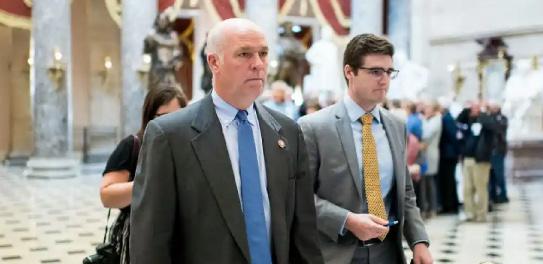 BY CLAIRE HANNAN, SECRETARY
BY CLAIRE HANNAN, SECRETARY
Gianforte Family Hall, the northernmost building of Gateway Academic Center, has been stained with controversy and student disapproval since Stevens announced it was to be named after wealthy alumnus and Montana governor, Greg Gianforte. Governor Gianforte, a prolific anti-LGBTQ+ law maker and infamous for assaulting a reporter in 2017, has been propped up by Stevens Institute of Technology as an inspiring entrepreneur despite ongoing student protests over the school’s involvement with him. In his most recent attack on LGBTQ+ rights, Gianforte may be signing into law Senate Bill 99 which will ban gender-affirming care for trans youth. Montana is just the newest state to pass a bill like this with nine other states enacting similar bans recently. Effectively, the bill would prevent medical interventions including hormone therapy and surgery for minors, as well as preventing public funds like Medicaid being used for these procedures.
On May 3 of this year, Governor Gianforte gave a brief interview where he said “we need to make sure everybody’s voice is heard as we make a decision,” and that they were “still collecting” input on the issue from “transgender parents [and] transgender children.” He said this in response to concerns over parents and families who were considering moving out of state to continue accessing medical care for their children. While Governor Gianforte has yet to sign this bill, he has a colored history with the LGBTQ+ community. Earlier in his role as governor, Gianforte signed
into law a bill that prevents trans youth from participating on sports teams that align with their gender. Gianforte is also known to have donated more then $1 million to anti-LGBT+ organizations since 2008.

Hailey Veres, President of Stevens Torch Alliance, a club dedicated to creating a social space for LGBTQ+ students, gave an interview with The Stute where she said Senate Bill 99 “is a step in the wrong direction” that will “unquestionably… hurt the lives of countless trans kids in Montana.” Veres also says that Gianforte’s beliefs do not represent the Stevens student body. As for Gianforte Family Hall, Veres is not sure what it would take for administration to acknowledge calls for a name change, but that “the naming of the building shows a certain level of indifference” from leadership, creating an even wider gap between students and administration.
While Governor Gianforte might have bought his way into Stevens history “Gianforte’s values go against that of Stevens’, and there’s no amount of money that anyone can donate to address that.” Veres urges anyone wanting to help the LGBTQ+ community to support organizations like Lambda Legal, the American Civil Liberties Union, and the ACLU of Montana. These organizations have all pledged to fight this bill in court if it is signed, and are likely to face an uphill battle in the coming months and years as they fight the countless bills nationwide threatening LGBTQ+ civil rights. Students could also help by raising awareness of the issues affecting the LGBTQ+ community both at Stevens and nationwide.
PRIDE AFTER DARK: A CELEBRATION AND A REMINDER
BY TASHA KHOSLA, FEATURES EDITOR
Pride After Dark is an event held every year at Stevens as a way to celebrate pride and bring the LGBTQ+ community to
gether. Although June is Pride Month, many colleges like Ste

vens recognize a week in April to give everyone a chance to cel
ebrate together during the aca
demic year.
This year, Pride After Dark was hosted on April 6 by Torch, oStem, and the Diversity and Inclusion Committee (DNI) at Techflex. The event is the culmination of Pride Week, which included events such as oStem and the Art Installations Club’s Tie-Dye, the Lavender Link-Up, the LGBTQ+ Resource Fair, and Drag Bingo. Pride Week also featured keynote speaker Tara Fuller, who discussed fostering inclusivity.
Pride After Dark itself was a three hour celebration where participants could enter raffles and play LGBTQ+ related trivia to earn prizes. Glitter tattoos were also offered as well as pride stickers, flags, and a backdrop to take photos with friends and even the performers for the event.
This year’s performers included drag queen Neon Calypso, drag king Myster E Mel Kiki, and DJ 622chaos.
Neon Calypso was a crowd favorite from last year’s Pride After Dark and was a hit again this year. She performed three times during the event and in -
teracted with the crowd each time. Some highlights of her routine include her doing cartwheels, jumping off stage, and dancing with a member of the crowd. Additionally, Neon Calypso promoted her upcoming docuseries Drag Queen of the Year: Behind the Pageant which is set to premiere on April 21. The show will be streaming on Roku, Apple TV, and OutTV.
Myster E Mel Kiki was awarded Best Drag King at last year’s 24th annual Glam Awards. They performed twice during the event and some of the highlights of their performance were dancing through the crowd and singing along to songs from the ‘80s.
622chaos is a senior at Stevens and provided all of the music for the night. He kept the energy up and danced with the crowd while Neon Calypso and Myster E Mel Kiki performed. Members of the audience were also given a phone number to text pictures to and those pictures were displayed behind the DJ during his performance. His set included original music that he produced, such as his most recent single “short hills mall.”
At the end of the night, Neon Calypso returned to the stage to remind us of the importance of supporting the LGBTQ+ community, starting with the organizations at Stevens. As students Maddie McIntosh and Claudia MacRae, members of DNI and oStem, emphasized, this event was completely student run. McIntosh and MacRae
hosted the event and worked with all three organizations involved to make the event run as smoothly as possible.
On a more serious note, the audience was reminded of how many organizations on campus have made a commitment to not use the Gianforte Family Hall building, also known as Gateway North, due to Governor Gianforte’s homophobic and transphobic rhetoric and harmful legislation against the LGBTQ+ community. As Neon Calypso mentioned, it is up to our generation to be the change in order to make sure all members of the community feel safe and respected. This includes working together to make sure our voices are heard.
As DJ 622chaos summarized, this school may not be perfect but we are lucky that we have this community and are able to host events like Pride After Dark. He closed out the night by reminding us to not be afraid to do what we love, whether it be singing, acting, drag, etc. The whole purpose of pride is to celebrate ourselves and be comfortable with who we are.
If you would like to become more involved with the three organizations at Pride After Dark, follow their Instagrams: @ostemstevens, @torch.alliance, and @dnistevens. Also, definitely follow the performers to keep up with them and their work. Their Instagrams are: @ neoncalypso, @mxmelkiki, and @622chaos.
4 Friday, April 14
-
-
-
-
2023’s
IN HIS MOST RECENT ATTACK ON LGBTQ+ RIGHTS, GIANFORTE MAY BE SIGNING INTO LAW SENATE BILL 99
WHICH WILL BAN GENDERAFFIRMING CARE FOR TRANS YOUTH. MONTANA IS JUST THE NEWEST STATE TO PASS A BILL LIKE THIS WITH NINE OTHER STATES ENACTING SIMILAR BANS RECENTLY.
PHOTO COURTESY OF BILL CLARK/CQ-ROLL CALL, INC VIA GETTY
PHOTO COURTESY OF YESMAGAZINE.ORG
ADMITTED STUDENTS WEEKEND
Admitted students day
BY TASHA KHOSLA, FEATURES EDITOR
With high school seniors reaching the end of their college decisions journey, the last milestone left is for them to finally confirm what college they will attend. As many of us probably experienced ourselves, this is not an easy decision to make. In an attempt to ease this decision for potential ducks, Stevens has planned various events throughout the month of April which serve as an opportunity for admitted students to get an insight onto Stevens and to see if Stevens is a good fit. Occurring several times throughout the months of March and April, Admitted Students Fridays allow potential students and their families to connect with current students, faculty, and administrators at Stevens. This provides accepted students and their families a chance to get their questions answered about financial aid, ad-
missions, and the next steps for enrollment. Student-led campus tours will also be provided which the incoming students can choose to participate in. All Admitted Students Fridays follow the same schedule so new students can elect to attend which one works best for them. For the remainder of the month, the Admitted Student Fridays are on:
- Friday April 21
- Friday April 28
The main event for accepted students is Admitted Students Weekend which will be occurring on Saturday April 15, 2023 and Sunday April 16, 2023. The agenda for this day includes a speech by President Nariman Farvardin, a meet and greet of the faculty and staff, campus tours, and the chance to learn more about student life on campus by speaking with student leaders of various different organizations at Stevens. At the end of each day, students and families are invited to enjoy various foods from
different Hoboken restaurants known as the Taste of Hoboken.
Lastly, IntroDUCKtion programs will be taking place from July 10, 2023 to August 11, 2023. IntroDUCKtion features virtual programs, some of which are mandatory, which allows the incoming first year students to get additional information and guidance about navigating life at Stevens.
Aside from the IntroDUCKtion programs, the Stevens Career Center will be providing several introductory career development workshops throughout the summer. Incoming students can take advantage of this to learn more about the resources available to them that can aid them throughout their time at Stevens.
With all these events and activities, incoming ducks and their families can hopefully get a good insight on if Stevens is a good fit for them and if they elect to come here, their transition to the Stevens community will be seamless.
Tips for choosing roommates, how to get along with them
Choosing a roommate can be a very stressful situation, especially in your first year. How are you expected to live with someone that you’ve barely met? Will you get along? What are they like? What if they don’t live near you and you don’t meet in person until August? There are a lot of unknowns when it comes to living with new people. Here are a few pointers to make the most of your living situation.
1. Get to know as many people as you can! This tip holds twofold: before choosing your roommate, make an effort to meet as many people as you can. It can be super scary to reach out to people, but it will be very rewarding when you have an idea of some of the people you
will see around campus before the semester starts! Secondly, get to know a bunch of different people, so you can have a variety of roommate options prior to declaring your housing situation. When reaching out to other new students, remember that everyone is in the same boat, and sending a quick message goes a long way toward making everyone feel more comfortable about the transition into college.
2. Find out what their interests are
A surface-level way to get to know someone is to ask what their interests are. Do they have any hobbies? What type of music do they listen to? What types of TV shows do they watch? These are great and fun ways to connect with people quickly if you have similar
interests, and it is fun to have a roommate who shares your interests, so you can do things together when you have any free time. However, it is not at all necessary to choose a roommate with similar hobbies as you. Living with someone with different interests than you (or someone who is a different major) is an easy way to expand your horizons while also reflecting and learning more about yourself and possibly growing your own interests.
3. More important than interests: Values While it may seem like a great idea to choose a roommate who watches the same shows as you and listens to the same music, it is unlikely to work as well as planned if you don’t share the same values on some essential things. And
Dorm options at Stevens
BY TASHA KHOSLA, FEATURES EDITOR
Stevens has a variety of housing options for incoming firstyear students, and each hall has its unique benefits and detractions. There are a few common amenities in each hall, including free laundry facilities and available kitchen spaces in each dorm. Ultimately, one of the major differentiators of each dorm is the factors that come with location.
Castle Point Hall
Castle Point Hall (CPH) is located on the upper part of campus and has five floors. Even-numbered rooms have a view of the Hudson River and odd-numbered rooms have a view of the campus. The rooms are all triples, with two beds in the main room, and a small single bedroom that does not have a door or a curtain. Each room also has its own private
bathroom.
While the view is nice, the major downside of living in CPH is the commute time to classes and the lack of space in the rooms. The rooms can be very crowded, depending on how residents choose to layout their room. Moreover, the main room does not have shelving the way the single room does. Also, there are no lounges and no elevators.
Davis Hall
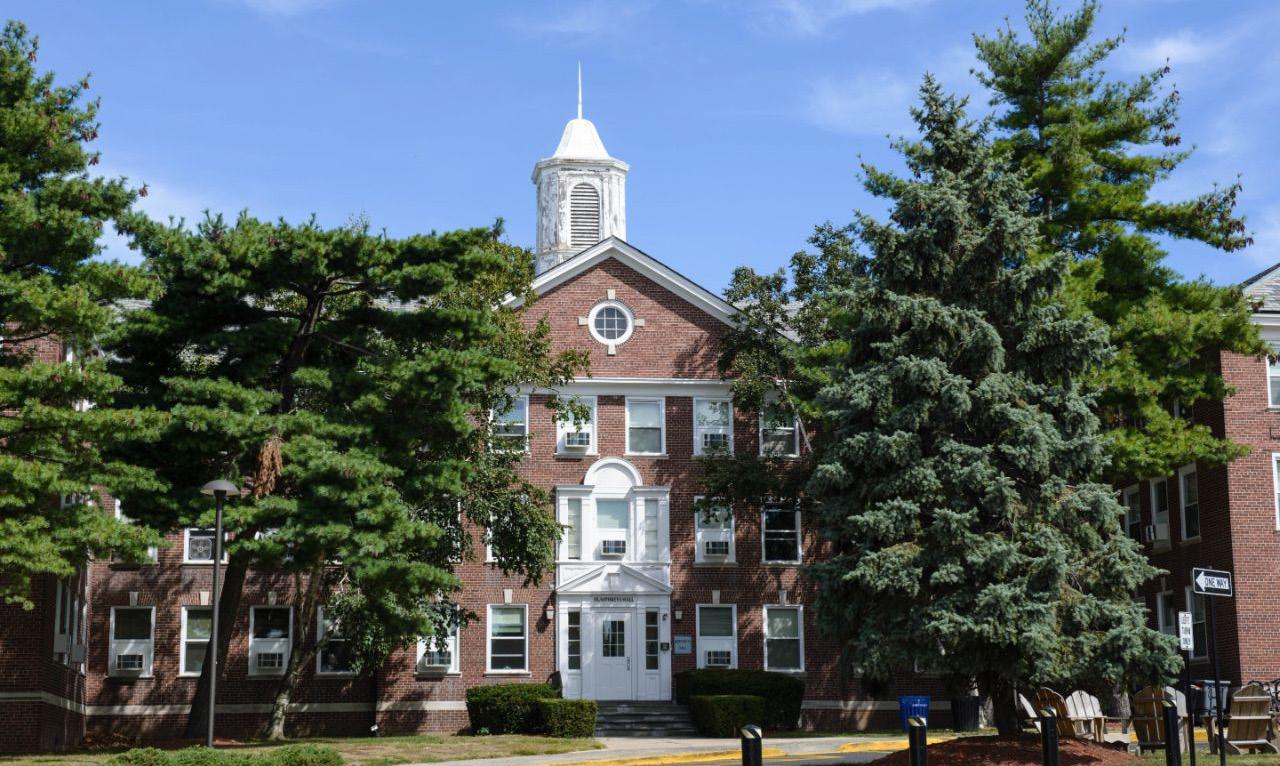
Davis Hall is located on lower campus and has very close proximity to the academic buildings. Odd-numbered rooms on the upper floors have a view of the Hudson River, while other rooms do not. There are communal bathrooms and this hall features lounges. The rooms are doubles and deluxe doubles, the deluxe doubles having an additional two soft seating chairs.
This hall has five floors but no elevator, with entrances on the
second and first levels. For students on lower floors facing the campus, privacy can be a concern since rooms are level with the street. The communal restrooms can also be seen as a downside, however they are cleaned by staff daily, saving students both time and responsibility. Fire alarms in Davis Hall are known to be sensitive, leading to a higher amount of evacuations than in other halls.
Humphrey’s Hall
Humphrey’s Hall is located on upper campus, near the Howe Center. This hall features double and deluxe double rooms and has communal restrooms, and a sand volleyball field nearby, although the building itself does not have an elevator. There are three floors and a basement that contains the laundry room. The deluxe double rooms have two soft seating chairs whereas the regular double rooms do not.
One con of this residence hall
most importantly, it is helpful to find a roommate who shares a similar work ethic to you and how they value their time. If you are always doing school work and do everything in your power to succeed in school, you are not going to get along well with a roommate who skips class and watches TV all the time. If you value your sleep and try to go to bed by 11 p.m. while your roommate stays up until 3 a.m. every night watching TV, again, it will not be a great situation.
4. Living habits
Other good questions to ask and things to keep in mind are when your prospective roommate goes to sleep or wakes up, what time do they normally shower (if you share a bathroom), if they plan on having people over frequently, and if
is the size of the rooms due to the lack of storage space. Also, the communal bathrooms have been an issue for residents in this hall. During the Fall 2021 semester, a bathroom in this hall was vandalized. Moreover, since Humphrey’s Hall is close to Palmer Lawn, loud campus events can often be heard.
Jonas Hall
Jonas Hall is located near the DeBaun Athletic Field and consists of double and a few triple rooms. The rooms have a private bathroom, for which students are responsible for upkeep and supplies. The floors are carpeted and there are shelves located above the beds. The hall also has lounge areas. Jonas Hall has six floors and an elevator. The closets have drawers and space to hang clothing. There are laundry facilities located within this hall.
A major con of living in Jonas Hall is its proximity to the athletic field and to the Greek life housing. During games, and on weekends, loud music can be heard coming from the field, which can often disrupt students who live on the side close to the field. As for the other side of Jonas, music from fraternity and sorority events can be heard as well. Another con are the shelves above the beds because it is easy to accidentally bump your head against them.
Palmer Hall
Palmer Hall is located on the upper part of campus and features singles and doubles. The doubles include two singles with a common area. These rooms are spacious and have plenty of shelves for students to use. Palmer Hall is in close proximity to Howe Center and the Samuel C. Williams Library. Moreover, the lawn outside of thiswww hall is often used for campus events, such as club fairs and movie nights.
they plan on regularly going home on the weekends. If you and your prospective roommate both have similar answers to these questions, chances are you will have a generally compatible living situation. 5. Keeping a good situation going, or handling a not-so-good one
The most important thing when it comes to maintaining at least civil roommate relations is to have clear and open communication. If your roommate is not filling up the Britta after they use it, ask them to fill it up, so you’re not always the one doing it. Sometimes, it can be difficult to step up and speak out to your roommate, but your living situation is what you make of it, so try to have good communication so it can be the best scenario for both of you.
Palmer Hall has three floors but no elevators, and every entrance has steps. The bathrooms are also communal and only located on the first floor, which can be inconvenient for students. There are also no air conditioning units so the rooms can become very hot. This hall does have a lounge but there are no couches.
River Terrace Suites
The River Terrace Suites are akin to apartments. These suites are located on lower campus and are adjacent to the academic buildings. Suites can have anywhere from two to seven residents living in either singles or doubles, along with private bathrooms. Some major benefits of living in the River Terrace Suites are the in-suite kitchenette, the living room, and the dining room. River 600 and 602 have four floors and River 604 and 606 have five floors total. Both buildings also have basements and elevators.
A con of living in the River Terrace building is it is located on the edge of campus, making it close to the academic buildings but far from the dining hall and other areas on campus.
UCC Residential Towers
These towers, primarily for upperclassmen, include private bathrooms and in-suite kitchenettes. Types of rooms available include premium singles, lofted doubles, two single bedroom suites, one single and double bedroom suites, and two double bedroom suites.
Although Stevens has so many housing options, it is worth noting that many can be inaccessible due to the lack of elevators. Also, certain buildings are newer than others, contributing to the overall living experience quality.

Friday, April 14 5 Feature
THE STUTE
AVA WANG FOR THE STUTE
PHOTO COURTESY OF STEVENS.EDU
I BET YOU CAN’T How science communication has changed
BY AVA WANG, MANAGING EDITOR
It’s getting to the final stretch of the semester where motivation is inevitably waning. I bet you can’t do the assignment you have been putting off. I bet you can’t put your phone down. I bet you can’t reach out to the friend you’ve been meaning to reconnect with. I bet you can’t keep reading this article.
If these statements made you uncomfortable, you just experienced one of the most influential theories in social psychology — cognitive dissonance. The theory of cognitive dissonance was first explored in the 1950s by social psychologist Leon Festinger, who proposed that inconsistency between beliefs or behaviors creates a psychological tension (dissonance), motivating the individual to restore consistency, or ‘consonance.’
In simple terms: humans love harmony. When lacking it, we will change our behavior or attitude to find it.
The induced-hypocrisy paradigm expands upon the foundational theory of cognitive dissonance. Inducing hypocrisy is a two step process: the individual publicly advocates for a socially desirable behavior, then privately reflects upon their own failure to practice the behavior they publicly preach.
Lead researcher of a 1997 study on hypocrisy and motive for self integrity, Dr. Jeff Stone, informs us that resolution of hypocrisy induced cognitive dissonance follows two strategies, direct and indirect. The direct strategy is to “alter an element of the discrepant cognition,” such as changing self-belief, compensating for the unwanted behavior, or distorting perceptions that lead to the initial discrepancy. The indirect solution, as the name suggests, reduces dissonance without altering elements of the initial discrepancy. Indirect resolution techniques include blaming others, “misattributing the discomfort to something other than the discrepancy,” and affirming “other valued aspects of the self,” unrelated to the discrepancy.
Stone’s 1997 study consisted of two experiments. In the
first experiment, heterosexually active participants were asked to videotape themselves giving a speech promoting condom use for a high school AIDS prevention program, and their speech motives were primed to be either personally or negatively motivated. Upon departure from the experiments, participants were given the opportunity to buy condoms at a steep discount (direct dissonance resolution) or donate money to a program to feed homeless people (indirect). In experiment two, participants were “made to feel hypocritical about their past failure to help the homeless.” Participants were then randomly assigned one of the three dissonance reduction groups where they: 1) had the option to directly restore self-integrity by donating to the homeless charity, 2) had the option to indirectly affirm self-worth by purchasing discounted condoms, or 3) were offered a choice between donating to the homeless charity or buying discounted condoms. Stone’s 2x2 factorial study concluded that when given the option between direct and indirect dissonance reduction techniques, individuals prefer to resolve their dissonance directly by adopting the behavior they advocated to others — even when an indirect alternative is just as available!
Although Stone et al.’s findings are profound, it is always difficult to make sweeping psychological conclusions. An individual’s susceptibility to cognitive dissonance discomfort depends partially on their disposition. I’m sure we all know a chronic hypocrite. As Dr. Corrine Leikam informed EveryDayHealth author Moira Lawler, “Some people may experience [cognitive dissonance] more intensely or frequently if they have a high need for consistency in their lives.”
Key takeaways? If you are struggling to stay on top of coursework or other responsibilities, try inducing your own hypocrisy paradigm. Utilize your built-in cognitive dissonance as a tool. Tell multiple people you are going to have ‘x’ done by ‘y’ time, and hold yourself to it! Or don’t, and devalue your self-integrity.
BY ERIN MCGEE, SCIENCE EDITOR


The year is 1665. At this time, most of science writing is contained in two mediums: writing letters (called the ‘Invisible College’ of letter writing scientists), and writing books. That changed, however, when Henry Oldenburg, the first secretary of the Royal Society, published Philosophical Transactions of the Royal Society, a subscription service that published experiments, observations, and other reports that came from members of the Royal Society. It is seen now as one of the first scientific journals, and is still publishing scientific articles today.
We’ve come a long way since sending letters or even needing to print academic papers anymore. While there are thousands of academic journals around the world that participate in the peer review process, there are also other options for sharing research that do not take the immense amount of time that publishing often does. ArXiv (pronounced ‘archive’), an opensource preprint server for scientific papers, reached an astonishing 2 million papers as of last year. The website has been compared to a ‘warehouse’ of manuscripts, some of which are eventually published in high profile journals, and is mostly used in the fields of physics, math, and computer science. The website allows for a fast turnaround on scientific research, with Steinn Sigurdsson, a professor of astrophysics at Pennsylvania State University and ArXiv’s scientific
BY NICK SMITH, STAFF WRITER
We all were raised not to lie. Lying is bad. We have been taught that way since we were children. A unique paradox exists between telling a lie and speaking your mind. If you do something wrong, it is expected that we fess up and admit the wrongdoing. However, what about when we receive a gift we do not like, or a friend tries a new recipe that is a total flop? We lie. We tell them we love the dish, or we like the new gift to avoid being rude when in reality we may have just wanted the gift receipt. But we also lie to protect people. There are times when dishonesty is the best policy in the interests of our relationships and a growing body of research shows this to be true.
Deception and trust are directly related in a relationship. In a cross-disciplinary paper about trust, trust was simply defined as “a psychological state comprising the intention to accept vulnerability based upon positive expectations of the intentions or behavior of another.”
When we deceive people it is expected that trust is lost, however there are a variety of circum -
director saying, “A telescope saw something on Friday. By Monday there are papers on it. By Tuesday there are papers rebutting the papers that came out on Monday.” Most people, however, do not usually hear about scientific breakthroughs by reading the paper that published it: rather, we consume it through news, headlines, Tweets, and posts after the fact. The shift towards a digital side of science communication has definitely brought with it benefits. Information is now more accessible than ever, and people can hear about revolutionary science as soon as it happens. Open access sources, like ArXiv, lead to a more general audience seeing a paper, which can lead to faster feedback, adaptation, and the ability to build off of previous results.
Digital science has also been shown to increase representation of voices in the field of science, with one study finding that “ratio of female to male scientists on Twitter (0.62) was greater than the ratio of female to male authors on US-based scientific papers (0.43).” While by no means a solution to the problem of gender inequality in science, it is promising.
However, the rise in social media and popular science has not been all beneficial. For one, researchers have noted that the shift has put a great deal of pressure on scientists to publish papers that attract attention, rather than those that are important.
In an ethical survey from the University of Cambridge, researchers found that “there’s
tendency… to drive efforts to big up what you’re doing, to argue that it is earth-shattering even when it just may be important,” said plant biologist Ottoline Leyser, who worked on the study. This can cause articles with flashy titles and eye grabbing headlines to be the center of attention, causing important research to fall by the wayside in the eyes of the public. This, in turn affects everything from funding to public opinion, and can even perpetuate science denial. Modern science communication not only suffers from the hype of headlines, but also misinformation. One study from MIT, which used a data set of real and fake articles taken from Twitter, found that “false news stories are 70 percent more likely to be retweeted than true stories are. It also takes true stories about six times as long to reach 1,500 people as it does for false stories to reach the same number of people.” At no time was this information trend more visible than during the COVID-19 Pandemic, when the constant turnover of research and regulation caused a circulation of false stories and misinformation.
Whether it’s an online preprint, a Royal Society Letter, or the Stute you’re holding now, we consume scientific information in some capacity almost every day. However it is everyone, including scientists, communicators, and readers, who hold the burden of making sure information is correctly researched, correctly interpreted, and correctly communicated.
stances when trust is gained or stays the same.
There are many different types of lies and they serve different purposes. Research done by professors at The Wharton School studied prosocial lies. Prosocial lies deceive people but result in increased trust. Many different types of trust and deception scenarios were examined; lying that benefits both parties in an interpersonal exchange was deemed beneficial for trust on both sides. In fact, a corresponding study done with lottery tickets and cash prizes demonstrated that individuals that were deceived trusted the individuals that lied to them but yielded a greater reward more than they trusted the the individuals that were honest to them but came with a weaker reward.

Research done in Management Science showed that people are less willing to lie about things that provide no benefit to them but provide value to others. It is worth noting that this research demonstrates that people are willing to lie to others when it has specific benefits. This goes against the cultural norm that honesty is always the best policy.
Benevolence based trust is essentially trust that is based on
good intentions and when we believe that our deceiver was well intentioned we are more likely to trust them after that. That is the exact phenomenon that is occurring here. Outside of rewards and mutual benefits, we deceive people to avoid harm. Anti-Absolutism is a term used in philosophy to state that even though lying is deemed morally wrong it is not always wrong. Philosophers have long stated that aversion to feeling harm is at the root of ethics and we are certainly willing to lie to avoid feeling this harm.
Lastly, common questions arise surrounding what causes this desire to lie. Compassion and empathy emotions are felt by the brain and severely impact how the brain makes decisions. Compassion is what increases the probability that someone will prosocially lie. The American Psychological Association showed in two joint studies that compassion drives prosocial lying. When we feel empathy toward someone we are more likely to lie in their favor. Lying is often taught as a moral fallacy, however, there are certain circumstances where lying can be beneficial.
6 Friday, April 14 Science INTERESTED IN SCIENCE JOURNALISM?Join our Science writing team! Reach out to Erin McGee, Science Editor (emcgee@stevens.edu) for more information – No experience necessary to write • thestute.com/category/science –
When deception is the key to trust
PHOTO COURTESY OF MEETING-CONVENTIONS.COM
IF YOU ARE STRUGGLING TO STAY ON TOP OF COURSEWORK OR OTHER RESPONSIBILTIES, TRY INDUCING YOUR OWN HYPOCRISY PARADIGM. UTILIZE YOUR BUILT-IN COGNITIVE DISSONANCE AS A TOOL.
Stevens Baseball Swept by Misericordia
 BY KAI WONG, SPORTS WRITER
BY KAI WONG, SPORTS WRITER
Originally scheduled for Thursday, April 6, the pair of baseball games against Misericordia University were moved to Friday, April 7, due to projected inclement weather.
In the first game, after neither team recorded a hit in the first inning, Misericordia scored a leadoff home run in the top of the second to give the Cougars a 1-0 lead. In the top of the third inning, after a hit-by-pitch and a single for the Cougars, their first baseman rallied in a runs-batted-in (RBI) single to extend the visitor’s lead to 2-0. While Misericordia attempted to bring home another runner and make the score 3-0, the Ducks got the tag at the plate to halt the Cougars from increasing their lead.
The Ducks finally found their groove in the bottom of the sixth inning after sophomore infielder Evan Pravato was walked to leadoff the inning. The Ducks’ performance was highlighted by senior outfielder Michael Reyes, recording a two-run home run to right field for the Ducks’ first hit of the game. Heading into the seventh inning, the score remained in favor of the Cougars at 3-2.
Softball adds
In the top of the seventh inning, Misericordia had a leadoff double and eventually scored on an error, giving the Cougars an insurance run. The Ducks hoped to rally and win the game in the bottom of the seventh with a leadoff single by junior Jack Irby, but the Ducks grounded into a double play and the Cougars held on to win at a margin of 4-2.
In the second game of the day, Misericordia jumped out to an early lead in the top of the first inning, but the Ducks came back in the bottom of the third inning. Senior Ben Tobio reached first on an error on the opening at-bat and then reached second when sophomore Victor Schilleci singled. Junior Christian Kreiser advanced both runners on a groundout later in the inning. In the next at-bat, Tobiotied up the game at 1-1 off of a wild pitch.
The game continued without any action until the top of the sixth inning when Misericordia hit a two-run home run to left field making the score 3-1. The Ducks were unable to respond the rest of the game, letting Misericordia snatch two key MAC Freedom victories.
Across both games, the Ducks only generated seven hits, led by junior Frank Tonina who totaled two of the seven. Wins were
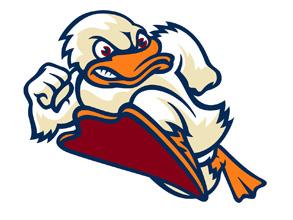
handed out to Misercordia’s David McCurray (7-2) and Steve Rinda (2-1), and losses were given to Ducks seniors Justin Doyle (43) and Ryan Shea (3-1) in the first and second games, respectively.
The Ducks are now 18-9 overall and 9-5 in the MAC Freedom. Stevens remains in third place in the conference standings and now
trails Misericordia by 2.5 games. The Cougars improved to 22-5 on the season and 11-2 in conference play. Stevens looks to finish the three-game series with Misericordia on Wednesday, April 12. The game will be in support of the Bristol Fire Department and will be played at Muzzy Field in Bristol, Connecticut.
a win and a loss in doubleheader against DeSales
BY RUTHIE MULLISKY, SPORTS WRITER
On Sunday April 2, the Stevens softball team played in a pair of MAC Freedom conference games against DeSales University at the Weehawken Waterfront Park. The Ducks won the first game 6-5, but DeSales won the second game 6-3. These games brought the Ducks to a fourth-place ranking in the MAC Freedom standings as well as a 4-2 conference record and a 12-10 overall record. However, the Ducks still rank higher than DeSales, as they hold a sixth-place ranking with a 3-3 conference record and a 12-6 overall record.
Stevens had a strong start to the first game, with junior Jessica Guerrero stealing second after a leadoff walk. Fifth-year Meg Halloran had a base hit bunt and she made it to second because of a DeSales error. Guerrero also capitalized on this error and scored, giving Stevens a 1-0 lead. This momentum was carried into the third quarter, with two more runs being scored. Guerrero hit a single and Halloran hit a bunt single, putting two runners on base. Senior Olivia Warner hit a RBI (runs-batted-in) single, bringing the Ducks’ lead to 2-0. Sophomore Madison Subbiondo hit a RBI double to allow Warner to score. Following this successful inning, the fourth inning continued carrying this momentum.
Graduate student Siobhan Cottell started off the inning with a single. Following her was senior Alex Schoellig, who hit a bunt to allow Cottell to go to second base.
Sophomore Emma Ruiz’s hit allowed Cottell to score. Guerrero’s home run to center field pushed the Ducks to a 6-0 lead.
First-year Ella Tozduman pitched all but one-third of an inning, and only gave up two runs on six hits and struck out four at bat.
First-year Ashley Allen also pitched, and gave up three runs on three hits.
In the second game, DeSales started off very strong, with three runs in the first inning and two more in the second, giving them
a 5-0 lead. In the bottom of the second inning, the Ducks began to put some runs on the board. Cottell hit a double, placing a runner in scoring position for the Ducks. Schoellig hit a single, allowing Cottell to score. The Ducks sustained this progress in the bottom of the third inning. Guerrero hit a single, in which Halloran followed by hitting a bunt single, and Ruiz followed with another single to load the bases. Following this, Warner’s hit allowed Guerrero to score. DeSales increased their lead at the top of the seventh, with the game now at 6-2. The Ducks tried to make a comeback in the bottom of the seventh inning, but
unfortunately fell short by three.
After these games, head Coach Emily Kaczmarek pointed out that the pair of games was a “Tough split for us… Fortunately, we have some practice days ahead to reprogram, challenge ourselves, and prepare for our upcoming conference doubleheader against Misericordia.” The Ducks lost both games against Misericordia, at margins of 1-8 and 11-12.
Stevens Softball currently stands at 12-12 overall and 4-4 in conference play. The team’s next games are April 15 against Lycoming College, another conference doubleheader, and will be played at Weehawken Waterfront Park.

MEN’S TENNIS New York University Hoboken, NJ 3:30 p.m.
SAT, APR 15
WOMEN’S AND MEN’S TRACK AND FIELD Bill Butler Invitational West Chester, PA Time TBA
MEN’S VOLLEYBALL MAC Championship Location and Time TBA
MEN’S GOLF Garden State Collegiate Classic Day 1 Washington, NJ 10 a.m.
BASEBALL Wilkes University Wilkes-Barre, PA 12p.m./2:30p.m.
WOMEN’S AND MEN’S LACROSSE King’s College (PA) Hoboken, NJ 1 p.m.
SOFTBALL Lycoming College Weehawken, NJ 1 p.m./3 p.m.
WOMEN’S AND MEN’S TENNIS Lycoming College Williamsport, PA 1 p.m.
SUN, APR 16
MEN’S GOLF Garden State Collegiate Classic Day 2 Washington, NJ 10 a.m.
WOMEN’S TENNIS New Jersey City University Hoboken, NJ 12 p.m.
TUE, APR 18 SOFTBALL Drew University Madison, NJ 3 p.m./5p.m.
WOMEN’S TENNIS DeSales University Hoboken, NJ 4 p.m.
BASEBALL Wesleyan University Hoboken, NJ 5 p.m.
STEVENS SCOREBOARD
Friday, April 14 7
ON DECK IN SPORTS BASEBALL Wilkes University Hoboken, NJ 3 p.m. FRI, APR 14
Sports
PHOTO COURTESY OF STEVENSDUCKS.COM (SHOT BY MIKE MCLAUGHLIN)
DATE TEAM OPPONENT LOCATION SCORE WED, APR 5 MEN'S TENNIS ARCADIA UNIVERSITY AWAY W (9-0) MEN'S LACROSSE WILKES UNIVERSITY AWAY W (25-2) WOMEN'S LACROSSE WILKES UNIVERSITY HOME W (21-0) THU, APR 6 MEN'S VOLLEYBALL VASSAR COLLEGE AWAY L (2-3) FRI, APR 7 MEN'S TENNIS MISERICORDIA UNIVERSITY HOME W (9-0) BASEBALL MISERICORDIA UNIVERSITY HOME L (2-4) BASEBALL MISERICORDIA UNIVERSITY HOME L (1-3) WOMEN'S TENNIS MISERICORDIA UNIVERSITY HOME W (7-2) SOFTBALL MISERICORDIA UNIVERSITY AWAY L (1-8) SOFTBALL MISERICORDIA UNIVERSITY AWAY L (11-12) WOMEN'S TRACK & FIELD VASSAR INVITATIONAL AWAY COMPLETED MEN'S TRACK & FIELD VASSAR INVITATIONAL AWAY COMPLETED SAT, APR 8 MEN'S TENNIS THE COLLEGE OF NEW JERSEY HOME W (7-2) MEN'S VOLLEYBALL ARCADIA UNIVERSITY HOME W (3-1) MEN'S VOLLEYBALL ALUMNI MATCH HOME COMPLETED MON, APR 10 MEN'S GOLF ALVERNIA INVITATIONAL–DAY 1 AWAY 3rd of 12 TUE, APR 11 MEN'S GOLF ALVERNIA INVITATIONAL–DAY 2 AWAY waiting MEN'S TENNIS FDU–FLORHAM AWAY
(9-0)
W
PHOTO COURTESY OF STEVENSDUCKS.COM (SHOT BY MIKE MCLAUGHLIN)
THE STUTE EDITORIAL
Stute-ing into the future: Welcome to the new E-board!
By Isabella Ziv ‘25 Editor-in-Chief
Last February, I went to my first Stute meeting and two weeks later, I was elected into the layout editor position with the 2022-23 E-board. At the time, I had no idea how important The Stute would become to me and my time here at Stevens. It has given me a platform to hone my leadership skills, develop my writing abilities, and connect with the Stevens community. I am grateful for the opportunities The Stute has provided me thus far and I’m looking forward to leading the newspaper through its 120th year of publication as Editor-in-Chief.
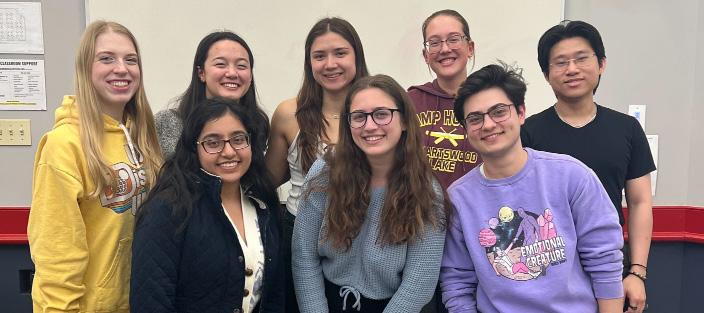
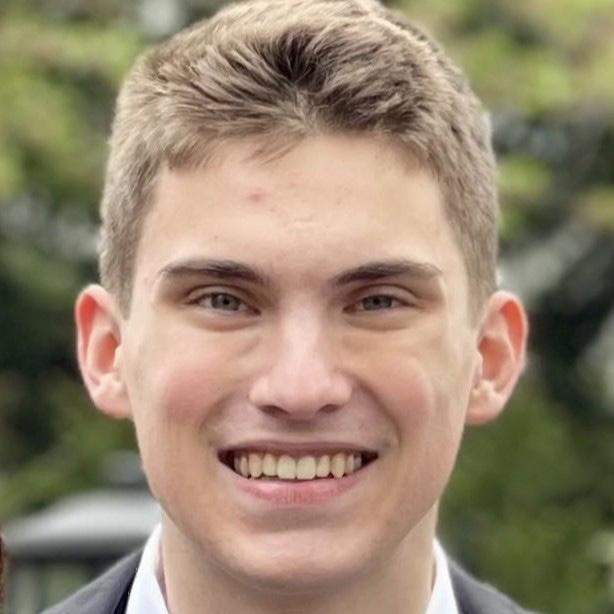
Firstly, I would like to thank Sanjana (our most recent Editor Emeritus) for being the best Editor-in-Chief, mentor, and friend I could have asked to work with this past year. I would also like to thank the previous E-board for how hard you all worked to keep the operation that is The Stute
running. I’m honored to take over from here, but I won’t be doing it alone: I would like to welcome the new members of the 2023-24 E-board!
Tanya, the Business Manager: Tanya is our green machine, managing all things money. She has written for The Stute as a staff writer since the Fall semester and has great ideas for expanding our business horizons. In less than three weeks in the position, she has already conquered the feat of the big budget meeting, securing our budget for next Fall!
Ava, the Managing Editor: In her short time with The Stute, Ava has shown so much eagerness to learn the ins and outs of the organization. She enjoys the little things in life (literally), is super thoughtful, and is a great leader. She has shown her passion for journalism, creativity, and work ethic, and I’m excited to have her lead our editorial team!
Nicole, the Layout Editor: Nicole has been writing for The Stute for over a year now and recently

MIND OF A FRESHMAN On loneliness
parents to come and get me. So I try to make the most of my time at home. I spent this past weekend at Church celebrating Palm Sunday (we’re Orthodox, so we’re basically a week behind everyone else).
BY RACHEL ABRAHAM ‘26
My freshman year has been fantastic. Well, not really. But it hasn’t been terrible, and because of that, I hate complaining. It could’ve been a lot worse. And while I am suffering through my classes at this point in the semester, I try to look at the bright side of things. That’s pretty hard to do, considering I only want to go back home. And while I was never expecting this urge to be so strong, it is, and I’m finally accepting it. Living away from home wasn’t as hard as everyone made it out to be. Yeah, laundry sucks, but that’s about it. Loneliness is the worst part of the ordeal, especially being so family-oriented. I hated having to miss birthdays, holidays, and other occasions. And while I only live about an hour away from Stevens, I always feel bad having to drag my
I never thought I’d miss the annoyingly long masses so much. The worst part is the whole thing is in Aramaic, and no one understands a word. Seriously, we’re all a bunch of Syriac Christians stuck with a dying language for the sake of the culture. But, nonetheless, I enjoyed it. I loved seeing my family and friends talking about college and everything that had been happening. Being surrounded by people of your own background is so comforting and honestly essential for me. That’s probably the only downside of Stevens; there aren’t many people like me here. Or I just haven’t found them yet.
I spent my spring break in Beirut, and as soon as I landed, I dreaded the flight back. I loved seeing my family members everywhere, spending time with my little cousins, and bonding over stuff Americans don’t usually like, like Tarab. Tarab is a genre of Arabic music that basically translates to “ecstasy.” The songs are hours long and never get tiring to
served as the assistant layout editor. She has always been super enthusiastic about layout and quickly became an essential part of our production team. It was difficult for me to give up my layout duties, but I’m confident that she’ll do a great job!
Claire, the Secretary: Claire (infamously known as the “Claire” component of “Dear Claire and Ethan”), is our behind-the-scenes organizer and scheduler, who also happens to be my roommate. When she’s not climbing a mountain, she works on keeping track of our operations. Her passion for The Stute has always been apparent and I know that she will be a great asset to our E-board!
Kayden, the Outreach Chair: Kayden and I joined The Stute at the same time. Since then, he has written plenty of news and feature articles, and recently started up a music column. Kayden will be the friend in the car that talks to the Uber driver because he is great at opening up and talking to and learning from his peers. I believe
listen to. Imagine every stereotypical Arabic song with a woman humming; that’s Tarab. I can’t play that at the after-party, not in Jersey. My roommate’s been pretty cool about it; she even suggested a few songs. This is probably my favorite thing about her; she always gives me room to feel “at home.” While I’ve struggled to feel included in spaces here, I’ve never felt like an outlier around her. And it makes up for that immense lonely feeling. The best part about coming back to Stevens is having debriefs about our weekends. If not for those conversations, I’d probably just stay home all the time. So thank you Zeynep, for making me not miss every single one of my classes (and listening to all the Umm Kulthum I play).
I’ve concluded by this point in my freshman year that if I can be around my family more, I’ll do it. I’ll take a crappy commute over this feeling of loneliness. But again, I couldn’t be more thankful for the connections I have made here, especially with my roommate. Living on campus taught me so much about myself, and I am incredibly grateful to have had this opportunity.
that Kayden has the ideal qualities of the outreach chair and I’m excited to work with him on outreach projects this upcoming year!
Raf, the Digital Manager: Many of you may know Raf as our resident Roving Reporter. If you’ve ever seen him in action with one of his 11+ cameras, you would notice his excellent eye for design. He has quickly learned the ropes of WordPress and has taken the reins of our Instagram. Raf has already done terrific work with posting articles to our website and creating social media posts, and we are fortunate to have someone like him on our E-board!
SENIORITIS
BY TREVOR DAMEIKA ‘22
As my senior year is coming to a close, my last few pieces will focus on bringing the senior class together with what we can do together. However, before I go into what we can do, I have to detail a story that took place this past week.
Recently, I was traveling through New Jersey to visit family via bus. On the way back, all of a sudden, the bus screeched to a halt in the middle of a five-lane highway. The driver exited his seat and left the bus. The entirety of the bus was focused on the right lane directly adjacent to our middle lane. There was a stopped car flashing hazard lights, with possibly an engine break or just out of gas, holding some of the traffic behind it.
The driver of the bus approached the driver’s side window of the seemingly parked car. As they began
Keenan, the Head Copy Editor: Keenan has been in nearly every Stute position possible, including staff writer, opinion columnist, layout editor, and managing editor. Now, she is the Head Copy Editor, a position that was newly added to our E-board. Keenan is most likely the reason this editorial is grammatically correct, as she is an expert on when to use an en dash versus an em dash—I still don’t know. I am thankful for Keenan, her copy editing skills, and her eagerness to help others improve!
Congrats to the new E-board, I can’t wait to see what we accomplish together!
to talk, the drivers honking at them became more and more frequent. The bus driver ended the conversation with the driver of the car. Approaching the furthest lane from the bus and closest to the side of the road, he began to wave his hands as he sprinted into this rightmost lane and halted their traffic as well.
The bus driver continued to have his hands holding up all of the traffic on the right side of the packed evening highway. He approached the rear of the broken-down car and pushed it across the lanes of traffic he was holding up to the side of the road. Impatient drivers immediately continued their drive as soon as the heroic bus driver pushed the car across to the side of the road.
After making sure the driver was alright, he sprinted across the highway in between speeding cars back to our bus. He hopped right back in the driver’s seat, receiving a large round of applause from the whole packed bus.
What does this story tell me? Well, it tells me about the importance of caring for others even though you need to do your job. Look, it could have been any single person on that highway, or any of those that drove around the
Student finds shortest path between two points
- SATIREIn an effort to continually minimize the distance walking between two points in Hoboken, a local student has taken advantage of his ability to phase through buildings to reduce distance. Due to the grid layout of Hoboken, most trips between two points are like walking along the two legs of a right triangle. Sometimes parks and (more dangerously) traffic intersections can be crossed diagonally to effectively traverse the hypotenuse of the triangle for a short time, but mostly, there are only two axes along which one can travel. As such, the field of walk-optimization has sprung up with the goal of finding the shortest,
most-optimal path between two points. Experts in the field, like the author, risk life and limb to cross intersections with cars waiting in all directions, and know which side of a tree to walk around to save fractions of a second.
The student in question discovered last week that he had the ability to walk through solid buildings. This is of course a complete game-changer for the entire walk-optimization industry as it means that city blocks with no parks can now be crossed diagonally. No longer must one now walk from the classrooms on 6th Street all the way to 8th Street before turning left towards their apartment. Now, they can simply pass through all the apartment buildings in their way. No longer
must they wait for cars on Washington Street, rather, they walk right through the passing cars, laughing to themselves at everyone waiting for the crosswalk.
The author asked this student to demonstrate the power during a scholarly meeting, where the two were discussing the feasibility of getting permission from lots of ground-floor apartments to use their entrances to courtyards so blocks could be crossed diagonally. It was at this point that the student stood up and walked through the table. The author’s monocle nearly fell off in surprise and he had to quickly re-twirl his handlebar mustache, lest anyone see it in a rather shaggy state. Setting aside the obvious upcoming Nobel Prize in
physics, the implications for the walk-optimization community were staggering.
Immediately, the author took up his old-timey pen and unfurled a sheet of parchment. “In an effort to continually minimize the distance walking between two points,” he began, but then put the parchment aside for a while to be finished later.
The author is always seeking to inform the masses about the nature of walk-optimization. It must first be understood that the act of turning 90 degrees to walk east or west is a “zig” and turning to walk north or south is a “zag.” Any turn to the diagonal, including through a park, is a “zog.” The goal is to have as much distance traversed on a zog as
possible. Legally, the author cannot encourage you to cross intersections illegally, but for many of the traffic signals on Washington Street, for the first 10 seconds that red hand sign is up, cars are stopped in all directions which is enough time to get across diagonally… if one were to choose to do so. When walking to or from campus, one should take the least steep hill while still heading in the right direction to take advantage of the smoothest vertical hypotenuse as well. When walk signals turn green, if you’re not the first person to reach the middle of the road, you’re probably walking too slowly. Always say hi to dogs you walk by. Stopping to pet dogs is considered optimal.
impaired car, who thought the most important thing was where they needed to be. Instead, a bus driver with the responsibility of an entire cramped bus on his shoulders stopped what he was doing to not only make traffic easier, but to possibly prevent an eventual accident.
It’s the same with us seniors. We will graduate from Stevens, and we still have the next chapter. However, that chapter won’t be effective unless we are patient with ourselves and with those around us. In moments, we must realize that we not only control our own personal journey, but also that we have the power to help others continue their journey even when they are stuck.
You can leave here knowing that your journey after Stevens is the most important objective to keep in mind. However, we are all in this together. We won’t be able to get anywhere without any help along the way. Additionally, no one will get anywhere without your help. Keep in touch with the people that you know. Ask if they need a hand to get through the obstacle that stands in their way. At the same time, when you go through something, they will be there as well. Let’s just channel our inner bus driver!
8 Friday, April 14 Opinion
We should all be that bus driver
WRITE A LETTER TO THE EDITOR Letters should be addressing a published piece in The Stute or to The Stute in general thestute.com/ policies for the full requirements
THE PRESS
OFF
BY OFF CENTER
SPORTS MATTER Tragedy and football
would remind him of Sandy Hook. He spent most of his school days in therapy using various methods to help him get through it. It wasn’t until Posey picked up a football that he could truly free his mind.
BY KYLE SLENDORN ‘23
The story of Reichen Posey is one of deep sadness and extreme hopefulness. Posey found football as an escape from the tragedy that struck him at such a young age. He also found a connection to another. This relationship would prove beneficial to both and inspirational to all. Posey’s story proves the power of sports and it can help even in someone’s darkest time.
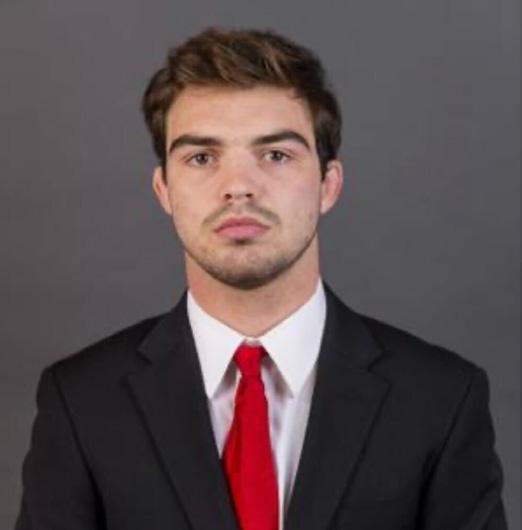
Reichen Posey was six years old on December 14, 2012, attending Sandy Hook Elementary School. Posey and his fellow classmates were huddled in the back of the classroom when a gunman broke in, shooting his teacher, Victoria Soto, and five of his classmates. While reloading, Posey ran out of the classroom and kept running out of the building to a nearby firehouse. Posey’s older sister, Amyla, thankfully survived the shooting as well. The damage to Posey’s sixyear-old mind had been done. He was not the same kid and struggled in all aspects of life. Even after his family moved to Colorado, he was still haunted by that day. The hardest thing of all was returning to school.
Getting through a day of school was difficult for Posey. Everything
THE CONVERSATION
Over the next few years, he would spend countless hours in his backyard with his parents just throwing a football back and forth. At school, when Posey had trouble staying seated, Maurice Carter, the school’s custodian, would pull him out of class to play football. Sometimes three times a day. This helped Posey immensely.
Through football, Posey was
introduced to Jordan Murphy, a football player at the University of Colorado. Murphy was attending a midnight showing of The Dark Knight Rises at Century Aurora 16 when a gunman opened fire on the crowd. Murphy, escaping with his friends, was nearly hit when a bullet hit the drywall only a few inches above his head. He was able to escape but, like Posey, the damage was done. To get his mind off of the tragedy he focused on football. There was an immediate connection when the two met. Posey and Murphy both suffered tragedies and found football as an
Donald Trump’s indictment
lack of trust in American institutions appears to be the bigger issue and is what both parties should be focusing on.
BY TASHA KHOLSA ‘25
Introduction Former President Donald Trump is charged with 34 felony counts of falsifying business records. An indictment was released on Tuesday, April 4, detailing the charges against him. The records in question are related to hush money he gave to two women prior to the 2016 election.
Campus Conservative, Marisa Powers
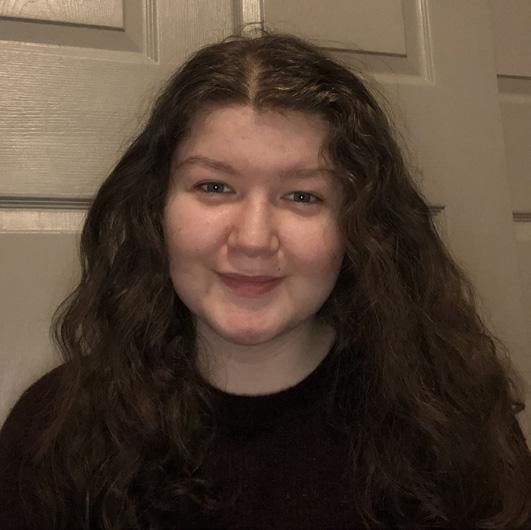
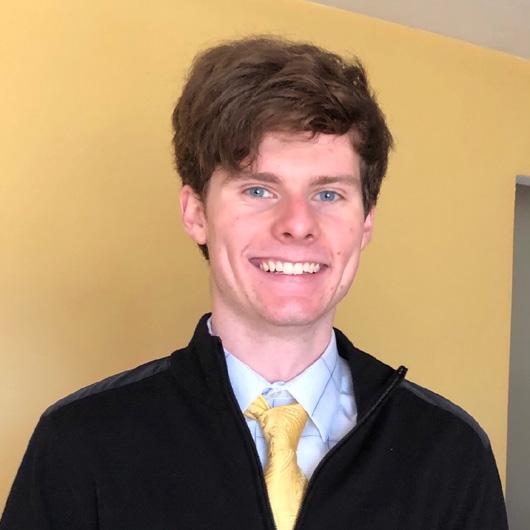
In my view, the indictment is a political charge against the former president. Both Democrats and Republicans agree that the indictment of Trump is politically motivated. A poll from CNN reports that 61% of Democrat-leaning and 94% of Republican-leaning Americans think the indictment was politically motivated. It could have something to do with the fact that it is the year before the next presidential election.
Some legal experts are also saying that the case against Trump will be difficult to prove. John Coffee, a Columbia Law School professor, said, “Trump’s attorneys could argue that the case should be dismissed because prosecutors have not sufficiently demonstrated the former president falsified records to conceal another crime.” Each count they are charging Trump with on the indictment reads similarly: “The defendant [...] with in-
BY MARISA POWERS ‘23
tent to defraud and intent to commit another crime and aid and conceal the commission thereof, made and caused a false entry in the business records of an enterprise.” Since there is no indication from the prosecution of what crime(s) Trump was allegedly trying to cover up by falsifying the records, it is only a misdemeanor under New York law. They will have to prove that he covered up another crime in order for it to be a felony.
I agree that it is difficult to trust those in political power as they sometimes have motives that are not entirely principled. However, former President Trump should be granted the same amount of fairness and scrutiny as others accused of criminal activity.
Campus Liberal, Tasha Khosla

Former President Trump’s indictment feels very politically motivated but is not necessarily a bad thing. In reference to the CNN poll, MSNBC describes the main issue of “America’s surging crisis of trust.” According to 2022 survey results from Gallup, trust in the criminal system declined even more and trust in the Supreme Court is at its lowest levels in decades. Yet, 60% of Americans agree with the indictment, despite many believing that it was politically motivated. The
Still, District Attorney Alvin Bragg is not wrong to have gone forth with the indictment. Although some question “whether this case would have been brought against any defendant not named Donald Trump,” the fact that this case is moving forwards is a feat of its own.
Former President Trump is the first president to be charged with criminal activity, which could potentially open up a new era of accountability.
As we know, there is the prospect of another indictment in Georgia due to “his January 2021 phone call to Brad Raffensperger, the Georgia Secretary of State, in which he pressed Mr. Raffensperger, a fellow Republican, to recalculate the results and ‘find’ him enough votes to win,” after his 2020 election defeat. Bragg has set a new precedent that could open the door for Georgia prosecutors to charge Trump with more serious crimes if they have evidence.
There is no denying that this indictment comes across as politically motivated and as a manifestation of broader issues facing the nation. Regardless, this situation is unprecedented and could potentially foster progress by furthering a culture of accountability.
Conclusion
Both sides agree that the indictment of former President Donald Trump is politically motivated due to the upcoming presidential elections. However, the liberal side acknowledges how the indictment could be a good thing for the country while the conservative side points out the unfairness behind it.
escape. Their connection didn’t end there, as they became close friends. The conversation rarely went to Aurora or Sandy Hook. It stayed on football. The two would continue their bond for years to come. After graduation, Murphy took a job as the strength and conditioning coach for the Lutheran High School football team. When the time came for Posey to choose a high school, it was fairly easy. Currently, Posey is playing for Murphy at Lutheran High School where they continue to help each other get through life.
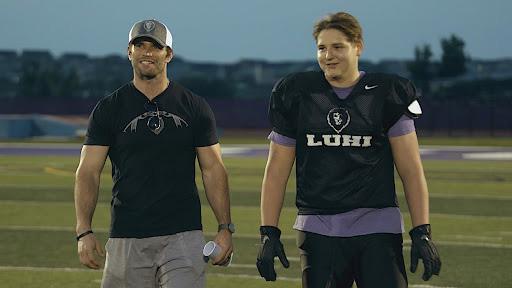
For Murphy, he was inspired
by young Posey. He had to return to the place of horror every day and face those horrible feelings. Jordan did not have to return to a movie theater but by finding strength through Posey, he did. For Posey, having a role model in Murphy helped show him that he could still live a normal life — that he could be successful at football. The two are in a club of their own: the club of tragedy and football. Their story shows football is more than just a game but therapy. A way to escape the hardships of life. A way to bring hope to an otherwise disheartening situation.
BY CHARLES BEALL ‘22
While I was traveling for the holidays this past weekend, I listened to several episodes of “The Joy of Why?” podcast, which explores new and revolutionary ideas or advances in mathematics and the sciences. I could probably write at least one article about each of the episodes, but the topic of one of them — category theory — is what I will try to cover for this week’s column.
Category theory, while a mathematical topic, is typically not covered in undergraduate or even graduate math programs, at least not directly. Described sometimes as “the mathematics of mathematics,” its goal is to formalize how mathematical objects are related to each other. Such objects can be related in lots of different ways, and each relation will give rise to a given set of patterns or other interesting properties. One can think of it as a mathematical game of categorization – thinking about a group of objects and placing them into categories based on how we’re relating the objects to one another.
A first question may rightly be: “what are these objects?” Well, they can be anything—which is what
makes category theory incredibly abstract. However, the more abstract something is, the more analogies you can make for it.
For instance, a group of mathematical objects could be a set of computer programs that perform certain functions. We could categorize these programs by their length, runtime, what types of functions they perform, what types of computer architectures they can run on, and so on. This is one recent application of category theory to the everyday sciences.
Another analogy involves linguistics. We could think of a language, or groups of languages, and categorize the words or groups of words in lots of different ways—part of speech, meaning, how often they’re used, etc. Chemists apparently have also used it for categorizing the vast array of molecules they deal with in the lab.
What was interesting about the podcast was how the guest, category theorist Dr. Eugenia Cheng, discussed potential applications to phenomena that most people would reserve for the social sciences. She talked about how category theory is very related to the concept of intersectionality, which has been used to study relationships among people from different racial, cultural, or socioeconomic backgrounds. Her belief seems to be that the possibilities for category theory are endless.
This idea was interesting to me, as it got me thinking about how math could be used to describe certain societal phenomena or other
large-scale things that are typically thought of as too difficult to describe quantitatively. Maybe the answer lies in increasing the abstraction of concepts while retaining enough structure — this would be known as a set of “axioms” in mathematics — that can make those abstract concepts useful.
This also brings up the debate between pure and applied mathematics (which Stevens, for one, recognizes in the name of its math department!). Certain mathematicians believe there is a fundamental separation between these fields based on the interests and goals of pure vs. applied topics. I find this division to be rather silly, and it would be nicer if there were a more symbiotic relationship between the two. It seems that Dr. Cheng agrees, as she connects her very pure-math field to real-world issues throughout the interview.
Category theory, if anything, shows that we can rethink how we differentiate certain objects from each other, sometimes leading to miraculous breakthroughs. Since applied mathematicians rely on the foundational proofs derived by their “purer” counterparts, and pure mathematicians can gain intuition by thinking of specific applications of their work, we should make like the category theorists and remove this division between types of math. This could also help further break down barriers between math and the social sciences, which I think would also be a great benefit to society.
Friday, April 14 9
Opinion
FOR MATH’S SAKE
Is category theory relevant to our daily lives? Categorically!
MUSIC TO MY EARS
100 gecs 2: 10,000 gecs
lyricism, an overly contrived purpose? The reasoning can be valid, taste is of course personal, but a testament to good art is that it provokes a strong reaction, even if it’s negative.
BY KAYDEN CANNILLA ‘24
While “What kind of music do you listen to?” is a good opener, I think “What music do you hate?” tells you more about a person. Are you the type to sit and grimace through a song you don’t like, or do you put in a request? What specifically is most offensive: the rhythm, or lack thereof, bland or vulgar
SPOILER ALERT
In my opinion, the worst thing music can do is be boring. Hyperpop, a new and loosely defined genre informed by grunge, bubblegum pop, and nostalgic internet culture, is certainly anything but boring. The saturated pop-music market of the 2010’s led counter-culturalists to draw on an ironic, flashy, glitchy version of pop; the type of music that makes Boomers lose faith. Pioneering artists include British artists Sophie and Charli XCX, though hyperpop became more concretely defined when Spotify titled a playlist with
the name, heavily featuring
100 Gecs. The responsibility of defining the genre seems to fall on 100 gecs, composed of singer-producers Laura Les and Dylan Brady, and their newest album is certainly more structured and cohesive than the first, cementing the genre and their influence over it.
10,000 gecs is just 27 minutes long, short enough to get stuck in your head and long enough for your roommate to get annoyed by the blasting static. It’s referential, using iconic sounds from the internet boom like the THX Deep Note, Scary Movie, or 2007 YouTube Spongebob memes; the sound bites are jarring yet calculated. It’s obvious producers Les and Brady know the structure of a mass-appealing pop song, they
just choose to ignore it, accenting the rhythms with absurd and constant interjections, like clickbait. On first listen, it’s easy to get distracted by the leaps in tonality, but there is a sincerity that shouldn’t be overlooked.
The vocals are heavily autotuned or deafeningly harsh, sometimes blending with the backtrack or in stark contrast to it. The lyricism is ironically devoid of content, but absurdly metaphorical. “Frog on the Floor” is a drawn-out metaphor about social anxiety leading to substance abuse: “I heard that he was telling croaks at the party…Give him some space, he doesn’t know what people think about” juxtaposed by an upbeat tracking and playful ribbits, with
Tár: an unreliable narrator (My Favorite!!)
the last quarter turning into a drunken stupor. My favorite might be “mememe,” the closing track and possibly the most palatable on the album. Its lyrics are hard to make out over the bass-boosted tracking, sounding like a video game outro that wouldn’t be out of place in a club remix. Repeated in the chorus is “I guess you’ll never know anything about me,” where the vocal loops remind me of Bo Burnham’s “We Think We Know You,” and the strain of the audience-performer relationship. The verses reflect a relationship gone bad because the speaker feels they aren’t being heard. The vagueness and disjointed nature give you what you want to get out of it, even a literal interpretation could yield different
results from different listeners. This album is a straightthrough listening experience, best felt in noise-canceling headphones or blasted through car speakers. If you’re around those unfamiliar, you might be able to get away with slipping “Hollywood Baby,” “mememe,” or “757” into a queue without much judgment, but tracks like “Doritos & Fritos” or “Frog on the Floor” will likely get you booted off aux. One British reviewer described 100 gecs enjoyers as “sticky iPad babies who have been assaulted by the internet since birth, who watched all their lockdown homeschooling videos on double speed, and get bored unless there are at least three sources of entertainment going at once.” I’ll give him 2/4.
BY JULIA WIERZBICKI ‘23
I like to think I’m pretty well-versed in movie genres. I’ll watch pretty much anything and, although I may not enjoy everything I watch, I can always appreciate it. If there’s one genre that I’m always bound to enjoy, however,

it’s the “unreliable narrator” genre. If you’re not familiar with the term, it basically means the main character can’t be trusted to relay information properly to the audience. For example, they may misunderstand or misinterpret something, leading the audience to have the same confusion. Or, they may start to see things that aren’t there that we, as the audience, also end up seeing. One example of this is the Netflix film I’m Thinking of Ending Things where aspects of the movie change as you watch, such as furniture, character ages, and even the clothing they are wearing. Tár is another excellent example of this. It follows a musician named Lydia Tár
BOOK OF THE WEEK
as her seemingly perfect life begins to fall apart. It’s clear from the start that Tár is troubled; she steals and misuses her wife’s medication, shows many signs of OCD, and feels extreme pressure from the world around her. This slowly accumulates throughout the film, leading to inexplicable scenes and what seems like a shadowy figure watching her at all times. There were several moments where I could’ve sworn I saw something on the edge of the screen and, when I replayed the scene, there was clearly something there that Tár and the other characters were not acknowledging. Because of this, the second act of the film reads much more like a horror movie than a drama,
in my opinion. It kept me on the edge of my seat the whole time, struggling to decipher fiction from reality and trying to put the pieces together of what was actually happening during the story.
Tár was up for several Academy Awards, including Best Picture, Best Leading Actress, Best Cinematography, and Best Editing, among others. Although most of these were won (and deservedly so) by Everything, Everywhere, All at Once (EEAAO), I believe that Cate Blanchett should’ve won Best Actress for her performance in Tár. I know it’s controversial, and don’t get me wrong, I love the winner, Michelle Yeoh, and her performance in EEAAO. But
Girl in Pieces by Kathleen Glasgow
deed, what makes the novel tragic is its realism, reminding the reader that the novel is not just some story, but represents the stories of millions of young adults trying to find the strength within themselves to live yet another day.
BY VICTORIA YASHCHUK ‘26
Out of all the novels I have read, Girl in Pieces by Kathleen Glasgow is the most tragic depiction of what it means to be a teenager battling mental health and the tumult of life. In-
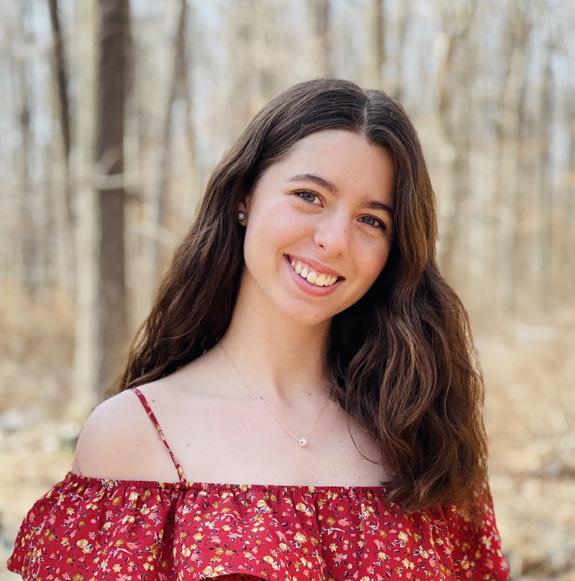
17-year-old Charlie Davis has experienced more in her life than anyone would expect, from her father passing to surviving an abusive relationship with her mother, getting kicked out, living on the street, abusing alcohol and drugs, to surviving a house where young girls were forced into prostitution.

Glasgow introduces the reader to Charlie in a way most authors do not — through unusually short chapters filled with menageries of Charlie’s thoughts and feelings. Through those thoughts and feelings, Glasgow allows the reader to put the puzzle pieces together, introducing Charlie as a patient in a psych ward for self-harm. At first, it is difficult to understand exactly what is going on in the book, which is the perfect way for the reader to fall right into the tumult of Charlie’s heart and mind.
As the story progresses,
the menageries form into full sentences, showing Charlie’s attempt to put the pieces of herself back together. After being released from the psych ward, Charlie moves out to Tucson, thanks to her friend Mikey, a boy Charlie has serious romantic feelings for. During her stay in Tucson, Charlie tries to make a better life for herself by getting a job, where she meets a semi-famous musician by the name of Riley West; the spark between Charlie and Riley was undeniable. Being friend-zoned by Mikey and having failed her attempt to have a relation-
Comic Corner
BY JOSEPHINA STRANO
much of Yeoh’s performance was acting confused and disoriented as she was thrown between universes and really only got to the gritty, downto-Earth acting in the finale of the film. Blanchett, however, was electric every time she was on-screen. There were so many subtle physical choices she made that really sold her character, like the frantic flitting of her eyes even when her expression remained calm to imply her inner turmoil. There were also several long shots where she spoke for minutes on end, effortlessly weaving among the set and camera that displayed masterful acting. I understand that Yeoh winning the award is meaningful, as she was the first Asian actress
to win in the category. That being said, if we’re going off of performance alone, I believe Blanchett should’ve had this one in the bag.
Tár is a very interesting film that really was not at all what I expected. It’s yet another one of those stories that I’m not really sure I fully understood, but I was completely enraptured with it and couldn’t stop thinking about it for days after. If you love a good unreliable narrator story (or are open to trying one out), I highly recommend checking this one out for yourself. It might give you a new appreciation for music – and have you questioning everything you see by the end of the film.
ship with Riley—as he was a reflection of Charlie’s pain—made Charlie realize that focusing on herself is the best thing she can do. Buying her own apartment, Charlie begins to live an independent life, giving all of herself to learn how to cope and never return to her old ways. After another heartbreaking argument with Riley, Charlie reaches her breaking point, where she is taken care of by her coworkers-turned-friends, Linus and Tanner. On their way to their grandfather Felix’s house in New Mexico, Linus and Tanner bring Charlie with them, where
Charlie finds peace by being surrounded by nature and letting her pain out the only way she knows how: through art. As a fellow artist himself, Felix notices Charlie’s artistic talent and invites her to work with him as his assistant. This offer makes Charlie realize that this is her only way out to find peace between herself and the world.
Glasgow’s emotional representation of “the girls who write their pain on their bodies” shows that those who self-harm are not alone and that those who write their pain on their bodies are seen.
10 Friday, April 14
Opinion
Opinion
THE DOODLING DUCK
Why you should be a barista at least once
BY ANAÏS BOUCHATTA
As a girl who’s struggled with memorization and has slight hearing issues, I am not sure how I landed a barista job, but I did. I recently got the job after deeply scanning and searching all directions of Hoboken since arriving at Stevens this past September. I can say I have walked into every restaurant you’ve eaten at within reasonable walking distance to ask if they were hiring. This includes two Starbucks, even one in the city. I had no experience in the industry, and I think that’s what stumped me every time. I am not saying I am underqualified, but I definitely was just a few months ago.
I can’t say I have tried every café, but I did apply to an impressive amount of places within a month. However, Dunkin’ was my limit. Many people I know have worked for Dunkin’, or still do, but as the daughter
GIRL TALK
of a chef, I know not to work at places I enjoy food from (you see unseeable things), and I did not want to ruin places like Dunkin’ for myself. I would forever choose a bagel twist over a salary any day. And even if I was brave and risked being scarred, I did not want to get tired of Dunkin’. My mom’s first job was at Dunkin’, and I can’t ever remember seeing her eat a donut. I wouldn’t dare have that happen to me. It’s like me and spinach ravioli from Costco. I had that repeatedly for a whole year in elementary school… so you can imagine the disgust now.

The start of it all was when my best friend from home and I saw a sign outside of a bewitched shade of green and a lovely pink-toned coffee shop with a long list of funky drinks. The drinks since learning have been fun to make, and what I enjoy even more is drawing on the sleeves when the shop’s empty. Occasionally, attempts to make something out of the latte foam lead to enjoyable disasters. My accidental latte art includes multiple hearts, a bunny, and a swan. I can do the hearts on command (with about 60% accuracy). Overall, I believe that those accidental masterpieces are cooler. It is even more fun when you surprise yourself, and that’s what I
For the love of reading
did with this whole job.
Making five drinks altogether was something I had just gotten used to a few weeks ago. When I tell my barista friends, they say, “Well, of course. Why wouldn’t you be able to?” Well, as a new, very slow, barista, I ask all the questions and further question myself even when I am almost sure I am fine. That’s kind of everything. This job really made me understand the process of learning. Everyone drops something at least once every shift and it may just be steamed milk and espresso, but it really comes full circle. I think having a job is really important, so why not be able to say you can make a macchiato*?
*I used to confuse these with Mochachinos.
The moments that I let myself be confident, I find myself doing evidently better. As a former customer without any barista experience, I thought that a barista was some form of perfectly functioning human. To my surprise, I could do barista activities with a brain that definitely struggles and is far from perfect. My coworkers have made it easy to transition into this job as they reassure me that I can ask all the questions I wish. I feel that the best type of people make you feel that way. I love asking questions, so it has worked out, and during my re-
cent shifts, I have not asked as many. This article might be me exposing myself, but if I got the job and continue to get more shifts, I must be good in some ways.
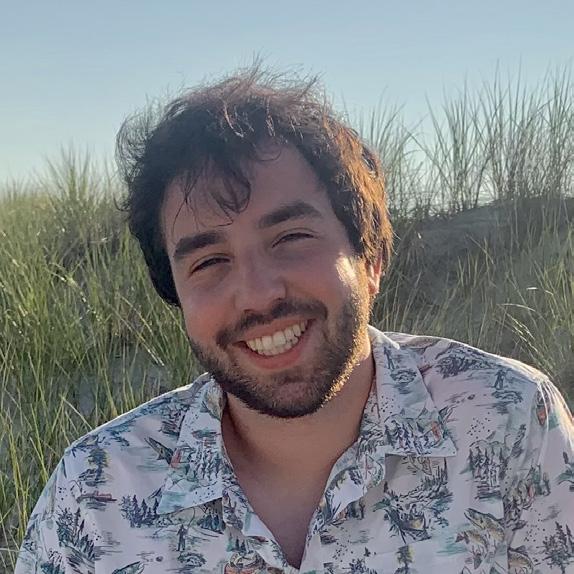
Since I wrote the first draft of this article a few weeks ago, I have continued to see improvement in my barista skills. And I still find joy in being someone who can not only make myself an iced matcha, but also make people’s days with a treat or a cup of coffee (we even have decaf and tea available). Complimenting people and having so many small conversations with customers is also a plus. I met a visual artist staying in Hoboken and working in the city for a Warner Bros movie coming out. There’s also a few Steves that come in that I’ve met. Either way, my point is that I believe anyone who enjoys making things or finds fun in the nostalgic Papa’s Donuteria games can find similar wonders in being a barista at least once in their lives. It was a good change. I believe that all people, but especially creatives, definitely must try working at a café. It’s like a video game in person that allows for a lot of development.
Oh, and sorry to those who got chocolate syrup in their Macchiatos before I learned the difference.
HISTORY OF THE DUCKS Martha Bayard Stevens and Hoxie House: A Story of Alexanders, Presidents, and Switzerland
filled with lavish furniture.
BY EVAN PAPAGEORGE ‘26
This week, I’ll be writing about a story that offers a little more humor than the topics I typically cover: husbands disappearing only to reappear 20 years later in Geneva, a house burning down, many men with Alexander in their name, and the legacy of the President. This is the complicated story of Alexander (Martha Bayard Stevens) and Hoxie House.
BY JORDYN RAMELLI ‘23
There is something so special about books. Their capability to take you into another universe, captivated by an intricate story unfolding at your fingertips, is truly magical. As a Literature minor, it goes without saying that I enjoy reading. I grew up surrounded by books, reading anything I could get my hands on. When I was in fourth grade, I even wrote my own book by hand on 100 pages of yellow looseleaf paper. But, I found that as I grew up, my usual reading time was overtaken by other responsibilities or things I viewed as “more important” than reading. I didn’t make any time to pick up a book. This semester I realized I missed reading and all the happiness it bought me. I began reading again, finishing a book a week these past 2 months. For this
column, I want to highlight two female leads I have found to be full of strength, inspiration, and intelligence. If You Could See the Sun by Ann Liang quickly became one of my favorite books — I finished it within 12 hours of starting. Before I start a book, I always read the last sentence, and this one certainly didn’t disappoint: “In the distance, the darkness has started to lift like a veil, the first light of dawn spilling over the Beijing skyline, a promise of all the beautiful and terrible sun-soaked days to come.” Ugh, speechless! If You Could See the Sun follows Alice Sun, a teenage girl from a humble family, who attends a prestigious school in Beijing, China. Surrounded by her rich peers, Alice constantly feels invisible, that is until she actually becomes invisible. As the story unfolds, you find that Alice comes from a struggling family who wants to give her the best, which puts a burden on Alice. In order to help her family financially, she gives it her all and steps up to the plate, full of courage and determination. Even if she may mess up and make mistakes, she is able to acknowledge that and grow stronger. I find Alice to be the epitome of hard work, going after everything she wants with grace. Behind
DEAR CLAIRE AND ETHAN...
Alice is Ann Liang, who in herself is a pretty awesome woman. She wrote this beautiful book in her freshman college dorm, which is just straightup impressive! And the best part is, one of the lines in her acknowledgments reads as follows: “Thank you to Taylor Swift for existing.” Check out her other book, This Time It’s Real.
The second female lead I want to touch upon is Stella Lane of The Kiss Quotient by Helen Hoang. Stella Lane, a young adult who has Autism Spectrum Disorder, works seven days a week as an Econometrician. She absolutely loves her job, and has succeeded tremendously, but she struggles in all areas that are related to men. This book follows Stella and her journey with escort Michael Larsen, and how two imperfect people can complete each other. My favorite part about this book is the perspective it gave me about people who have autism — I enjoyed being in Stella’s head and looking at life through her perspective. I truly felt like I learned something when I finished reading. Stella is strong-willed, motivated, and unapologetically herself. I found myself wanting to be best friends with Stella! I laughed with her, felt her pain, understood her sor-
Q: Should I change my major?
row, and rooted for her till the very end. Another thing I absolutely loved about Stella is her passion for her profession, and how much she excels at it. It was inspiring to see Stella in love with her job, and I hope I can find something like that outside of school. The last sentence of this book tugged at my heart’s strings: “Palm to palm, two lonely halves found comfort together.” Behind Stella is New York Times bestselling author Helen Hoang, a talented writer who creates such loveable characters. Hoang also has autism, and she is revolutionizing how we view romance novels. I started reading her next book in the trilogy The Bride Test, which has captivated me — I’ve been spending my days reading it by the pier.
Alice Sun and Stella Lane are two female characters who I look up to. While they may not be perfect, they are real. I see myself in each of them, and I can relate to their experiences. I am so happy I decided to begin reading again. Books bring me joy, knowledge, fun, sorrow, laughter, and so much more. I quickly remembered why little Jordyn loved reading so much. I hope next time you have a free moment, you can find a book to indulge in and enjoy!
As is often mentioned in this column, Stevens was founded through an act of incorporation on February 15, 1870, through money and land set aside by Castle Point by the patriarch of the Stevens family, Edwin A. Stevens. The main executor of Edwin A. Stevens’ will was his wife, Martha Bayard Stevens. She lived in the famed Castle Stevens, even following her husband’s death in 1868. Another executor of Edwin A. Stevens’ will was Martha’s brother, Samuel Bayard Dod, who was also pivotal in the creation and early years of the school — so much so that Dod was instated as the first President of the Trustees from the school’s opening until he died in 1907. As President of the Trustees, Dod needed to be on campus, so his sister Martha helped direct the construction of a house for him. The house quickly changed hands though, as Martha gave it to her daughter, Caroline Bayard Stevens Wittpenn as a wedding gift to her husband, Archbishop Alexander, after whom the house was named.
While all seemed well in the ornate Alexander House, things changed swiftly as Archbishop Alexander disappeared and was assumed dead. Caroline lived in the house named after her assumed dead husband until it caught fire in 1909. Although she was not in the house at the time and most of the contents had been sent to storage, the house was beyond repair and needed to be rebuilt. The new house, finished in 1910, was the pinnacle of design at the time, featuring a widow’s walk with views of Manhattan, an ornate baked-brick facade, and many spacious rooms
Settled into her new house, Caroline was due to marry again, this time to the former mayor of Jersey City, H. Otto Wittpenn, after whom the Wittpenn Walk is named. However, once the wedding was announced in the papers, Archbishop Alexander, who had been assumed dead for 20 years, published a personal ad in the New York Times, exclaiming he was not dead, but traveling Europe, “even now appearing at Geneva, [his] current place of residence.” Nevertheless, Caroline married Wittpenn and remained so until Wittpenn’s death in 1931. With their marriage, the Wittpenns moved to Jersey City, leaving Alexander House vacant. It was at this time that President Alexander Crombie Humphreys (not to be confused with the many other Alexanders in this story) took office after the death of Stevens’ first president, Dr. Henry Morton. Humphreys and his wife, Eva, moved into Alexander House in 1916. Humphreys only lived in Alexander House for just over a decade before moving into Hoxie House. Since then, Alexander House has been everything from faculty housing to the Student Center.
Hoxie House was named after William Hoxie, a Stevens graduate from 1889. Hoxie passed away in 1925, leaving $50,000 for the university in his will. The cornerstone of Hoxie House was planted by Mrs. Hoxie, and the commemoration even received recognition from President Hoover. Hoxie House stands on the foundations of Richard Stevens’ mansion, built in 1895. The manor was sold to the government in 1917 for use in World War I and remained so until 1927 when it was sold to the university. Hoxie House was built on Richard Stevens’ mansion’s foundations and includes a dining room, living room, library, and kitchen, as well as a terrace with breathtaking views of the Hudson River and Manhattan. The house remains the president’s residence to this day, currently by President Farvardin.
So, after many different Alexanders, an assumed dead husband abroad in Switzerland, a house on fire, much has happened to Alexander and Hoxie House. With the renaming of Alexander House to Martha Bayard Stevens House, the university continues to develop forward, while remembering the history of these two historic and beautiful homes.
BY CLAIRE HANNAN ‘24
Realizing that the major you’re pursuing doesn’t align with your goals and/or talents can be panic-inducing. I promise you though that it’s not the end of the world. No matter how far
you are through college, or what major you’re switching to or from, you aren’t trapped in any one career forever. The first step, no matter what year or major you’re in, is to meet with your academic advisor. They have a lot of experience with people switching their majors, and will likely have good advice. If you’re a freshman or sophomore, switching shouldn’t be impossible. Just make sure you’re switching to something that is better for you. Talk to professors, do research, and get as much information as you can about your new major. If you’re
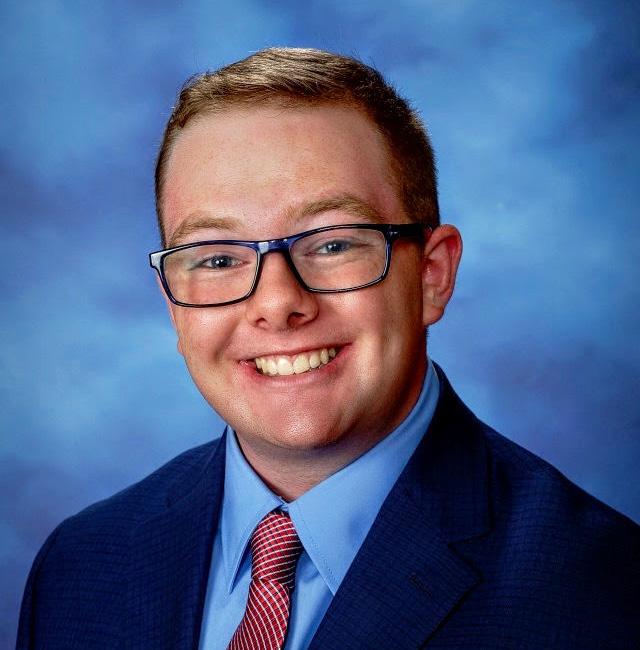
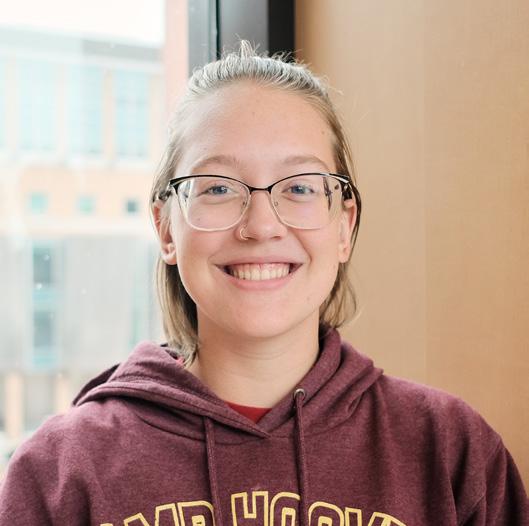

a junior or above, I would recommend that you stay in your current major if you can. Get your degree and then pursue whatever career you have in mind with a grad degree. It might also be fully possible to start a career unrelated to your major. Most of the time, you can learn all the skills you need on the job and employers are just looking for a degree in any area. I, for example, am considering different careers outside of my major, Civil Engineering, but I’m still going to finish my degree and will figure out how to branch off to something different after graduation.
BY ETHAN KLESCHINSKY ‘24
No, you should just drop out. Honestly, with the cost of college these days, if you want to switch your major keeping you here for an extra semester or two, your best bet is to drop
Cut your losses and hit the road, see what you could do with the limited skills you have obtained during your time here without having finished your degree. To be honest, giving up and starting anew might lead to a better life than completing your major and being miserable for the next 40-50 years, so it’s not even the end of the world. Classes get hard as time continues and you will begin to ask yourself if you made the right decisions to get to where you are now. My best advice is to either keep your head high and power through or let go before it’s too late.
Debt is temporary (sometimes), but being a miserable piece of sh*t is forever. If I’m being honest you probably won’t like your new major anyway, they all kind of suck, and if you can’t handle the heat that is okay. If the work is too hard, you can always switch to something easier or relegate yourself to community college. It’s just important to know that whatever your choice is, it is definitely the wrong one and you will regret it for the rest of your life. So make the decision that you feel is best for you and live with it. Keep moving forward. Good luck!
Friday, April 14 11
out.
‘26
“I
ROVING REPORTER
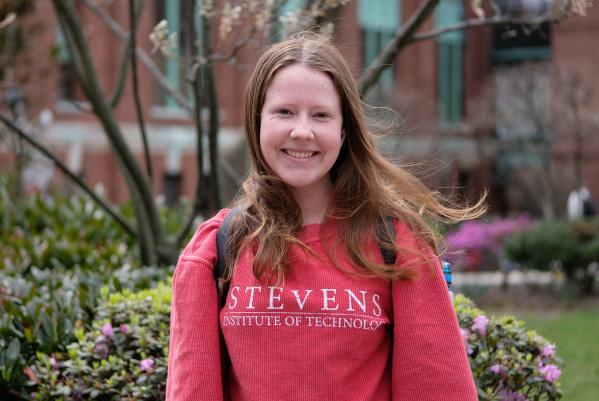
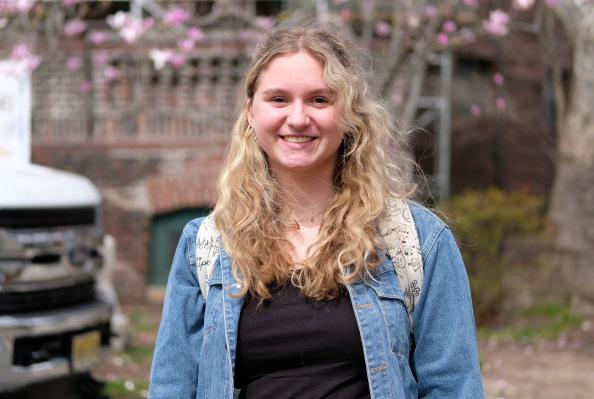
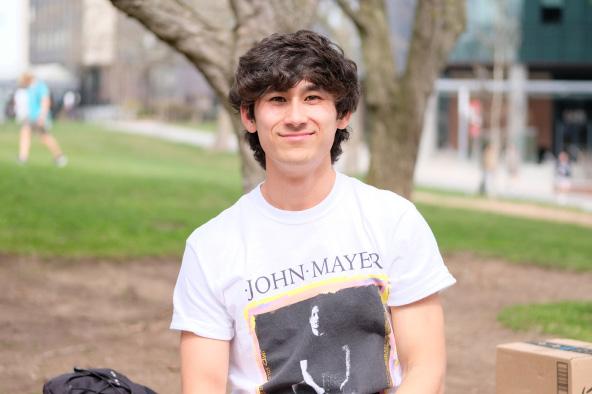

 By
By
Campus Pulse Sudoku
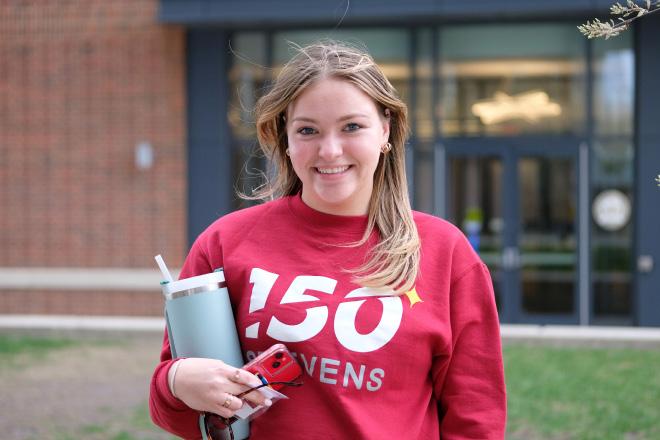
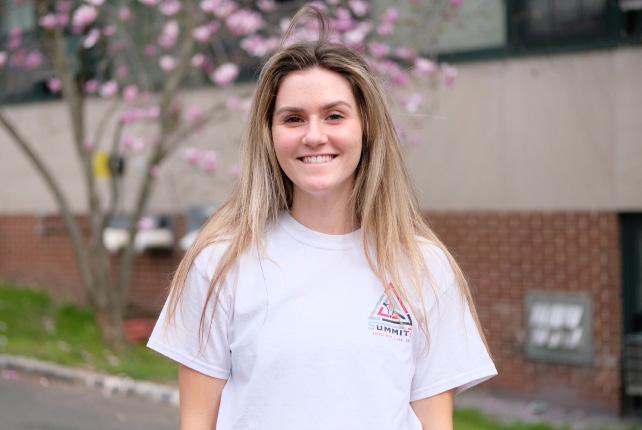
Medium Puzzle: 0.48 difficulty
THE STUPE 2023 PUZZLE ANSWERS:
This puzzle is composed of three parts.
First, cut out the jigsaw puzzle and assemble the image. To assist with assembly, gray blocks have been added to the edges of each square. If you were unsure if you should literally cut up the puzzle, the title and the sponsorship clue the idead of cutting it up. The completed image has a sequence of diamonds and stars.
The second section of the puzzle involves translating this sequence of diamonds and stars to Morse code. Notice the bold letters in the instructions spell “morse”. The clues in the directions point you to an ad in another part of the newspaper. The ad for Spencer’s Scissor Emporium (look at how cute my dog, Spencer is) has a clue at the bottom: “A DIAMOND-DOT STAR-DASH COMPANY”. In the solved jigsaw image, treating diamonds as dots and stars as dashes for Morse code leads the solver to the message: “SATIRE ARTICLE IS MORSE CODE”.
Finally, go to Matt Brantl’s satire article. Some of the sentences have an unsual amount “dot” and “dash” occuring. Treating each sentence that contains “dot” and/or “dash” as a letter, you get the message “ANSWER IS CAMEO”.
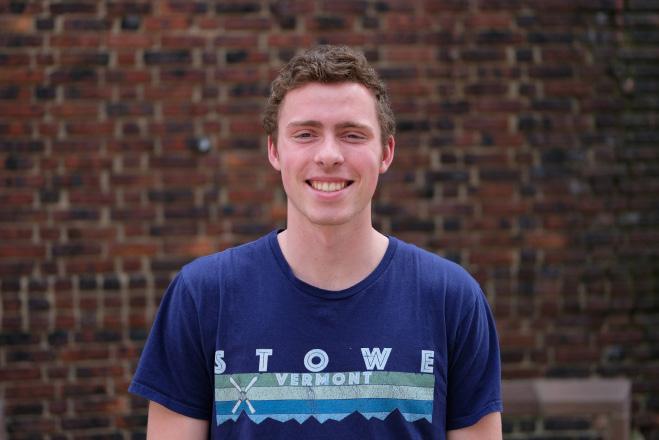
CAMEO is your final answer.
Hope you had fun with it, Stephen
12 Friday, April 14
Anjali Chandrasekhar ‘23 “Break up with your high school boyfriend.”
Bridget Harte ‘23
feel like I always stayed in and did work so it would be to go out and have fun.”
Fay Feygin ‘23 “Stop caring about what everybody thinks of you”
Anna Dabrowski ’26 “Don’t go in as engineering.”
Mark Bigsby ’26 “It gets better and it goes by fast. So enjoy it.”
Felicity Heilferty ‘26 “Don’t get too caught up on the little things.”
Rocco Mathews ‘25 “There is just so much.”
Danny Jutras ‘26 “Don’t take life too seriously.”
Medium Puzzle: 0.59 difficulty
“What advice would you give to your first-year self?”
Rafael Lee Li and Mia Petrolino








 BY KATIE BLOOMER, STAFF WRITER
BY KATIE BLOOMER, STAFF WRITER


 BY CLAIRE HANNAN, SECRETARY
BY CLAIRE HANNAN, SECRETARY







 BY KAI WONG, SPORTS WRITER
BY KAI WONG, SPORTS WRITER






















 By
By


